Feed aggregator
Tubi Dive, Part II
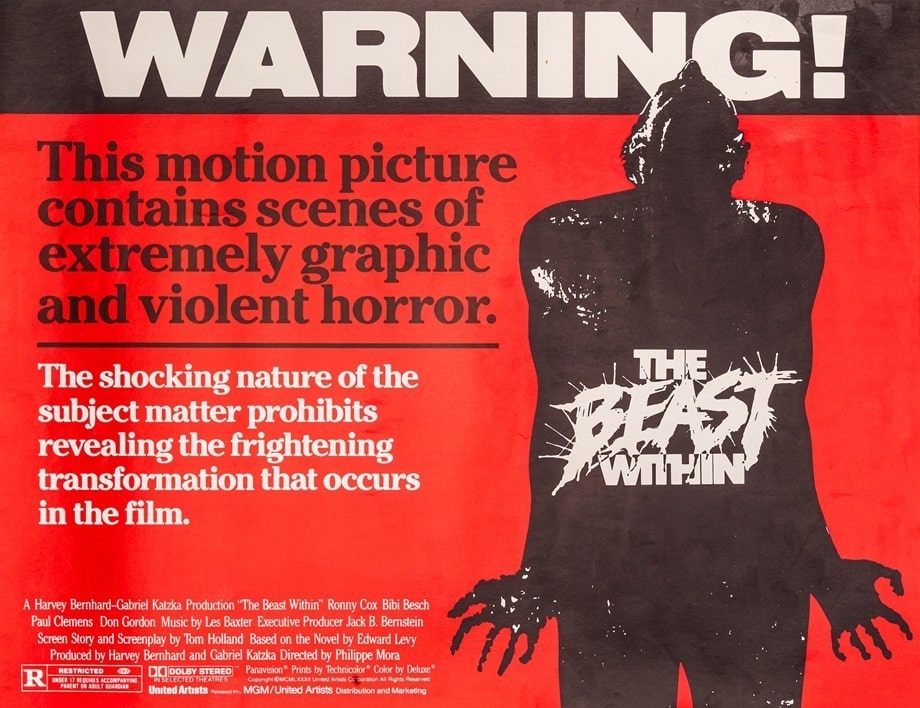 The Beast Within (United Artists, February 12, 1982)
The Beast Within (United Artists, February 12, 1982)
50 films that I dug up on Tubi.
Enjoy!
The Beast Within (1982)This crusty classic from the early 80s exemplifies the beautiful state of the horror genre at that time. This is one of the first writing credits for Tom (Fright Night, Chucky) Holland, and he wears his influences on his sleeve. HPL is well with the theme (evil possession, familial curses) and a couple of character names (Dexter Ward, the Curwins), but for me the primary influence was Hammer’s Curse of the Werewolf (a woman is raped by a foul individual, her subsequent offspring has a hard time of it), although this film could easily be called Curse of the WereCicada — such is its nutty premise.
The young man who has a ‘beast within’ seems to be possessed by his criminal father (later to be echoed in Chucky?), is played quite well by Paul Clemons in essentially a duo role, and anything with Ronny Cox in it is automatically a hit in my book. That said, the film is justifiably derided for some of the acting, and the entire storyline, but it’s a glorious smorgasbord of sweaty, sleazy characters and over-the-top latex bladder effects.
6/10
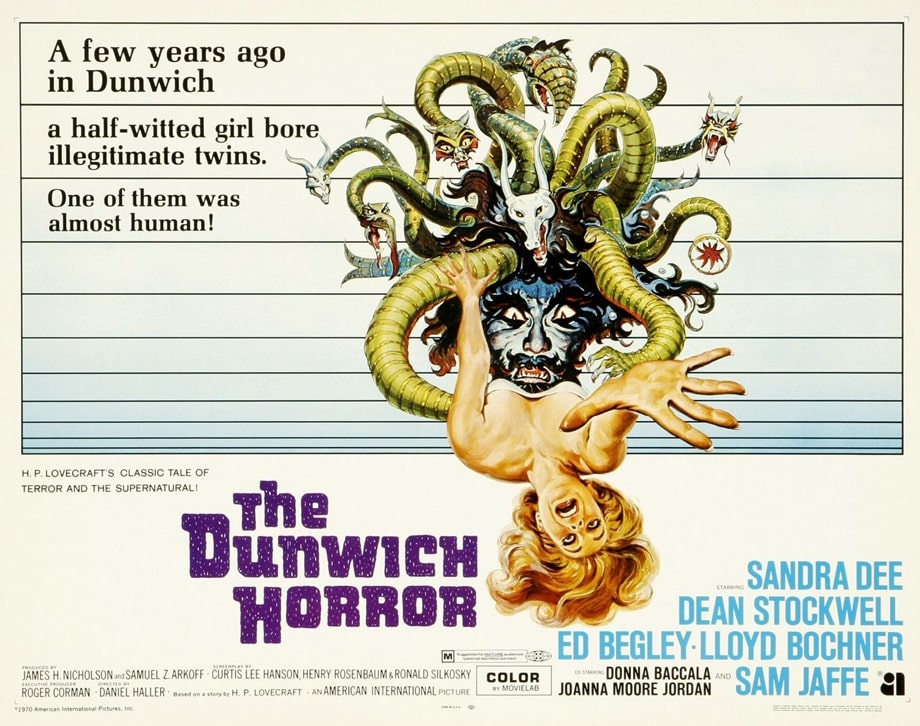 The Dunwich Horror (American International Pictures, January 14, 1970)
The Dunwich Horror (1970)
The Dunwich Horror (American International Pictures, January 14, 1970)
The Dunwich Horror (1970)
Yes, I can hear some of you clutching at your pearls as I write this, but barring a couple of clips here and there, I had never actually seen this one before.
As Lovecraft adaptations go, I guess you could say this is one of the most faithful, what with familiar names and places and ‘Yog-Sothoth’ being yelled approximately 300 times, but it is a far cry from the original source material.
Corman must have read the description of Wilbur Whateley (“goatish”) and interpreted that as ‘horny,’ because this version of WW just wants one thing, and that’s Sanda Dee naked on a sacrificial shagging stone. This is Dee’s first ‘mature’ film, and I wasn’t impressed — she’s a bit bland in this, however, Dean Stockwell as Wilbur is amazing. Now there is an actor who is FULLY committed. The monster in the attic is a bit of a letdown, depicted more like a colour out of space than the sort of tentacled beastie that butters my toast, but the production design is rather lovely, and there are some great matte paintings on show.
Fun for viewers who like gibbering madness and drugged tea.
6/10
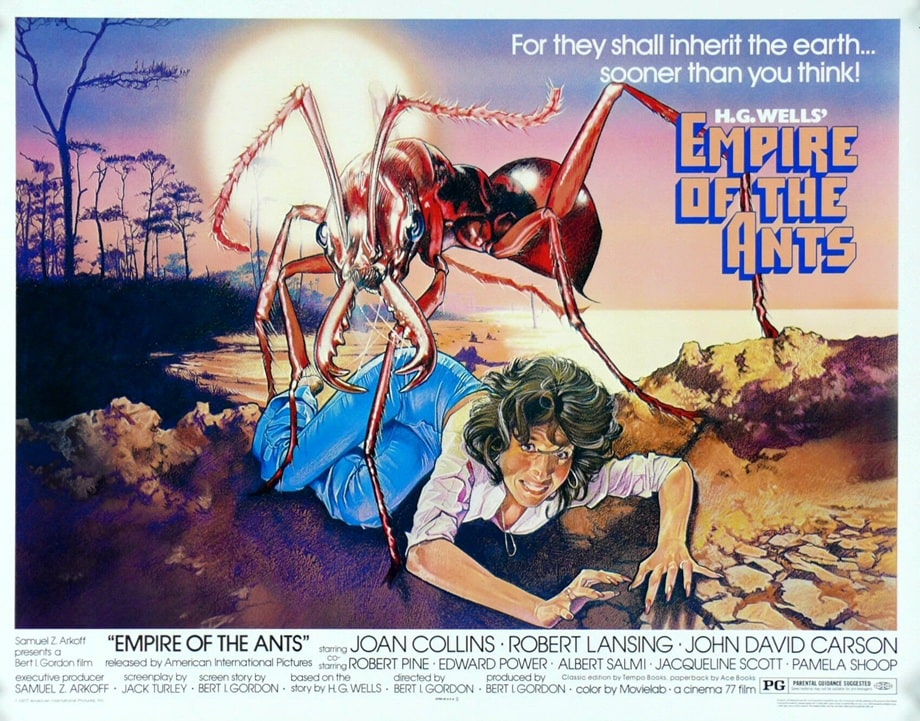 Empire of the Ants (American International Pictures, July 29, 1977)
Empire of the Ants (1977)
Empire of the Ants (American International Pictures, July 29, 1977)
Empire of the Ants (1977)
During that heady time in the mid 70s when so many creature features came out (Jaws, Grizzly, White Buffalo, King Kong et al), this one popped out at the tail end of the boom. I’m a sucker for ant movies (Phase IV, Naked Jungle), and this movie had assumed near mythical status for me, based on a few late-night clips on TV when I was a youngster, and a black and white picture of Joan Collins looking unperturbed, from one of the books that shaped my youth, Sci-Fi Now.
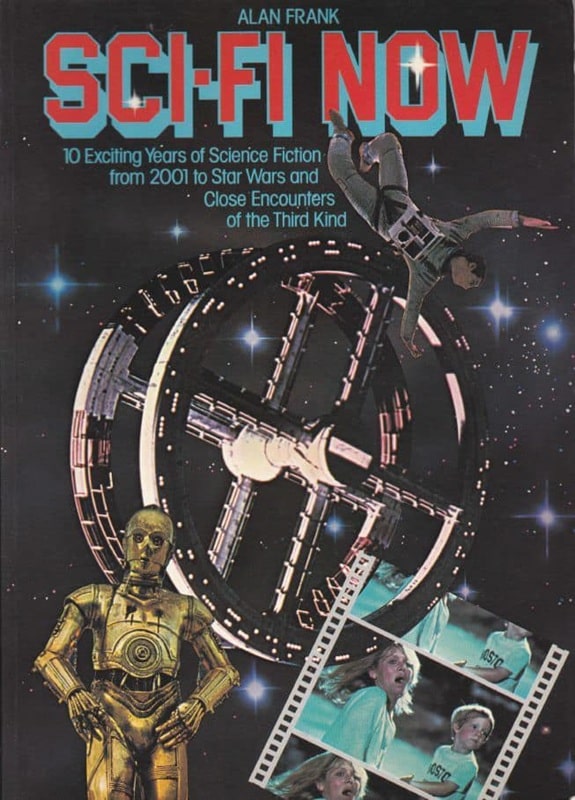

Sci Fi Now by Alan Frank (Octopus, January 1, 1978),
containing the classic still of Joan Collins in Empire of the Ants
Watching it now, as a bitter old man, it’s a bit rubbish.
Directed by Bert I. Gordon, from the H. G. Wells story, it’s a cheesy romp, and set mostly in the Florida Everglades. In the last third of the film the setting moves to a pheromone-controlled town, and this would have made a much better film, however, the preceding snooze-fest in the woods is a bit of a slog. Dodgy effects and horrible sound effects are the icing on this ant-ridden cake.
5/10
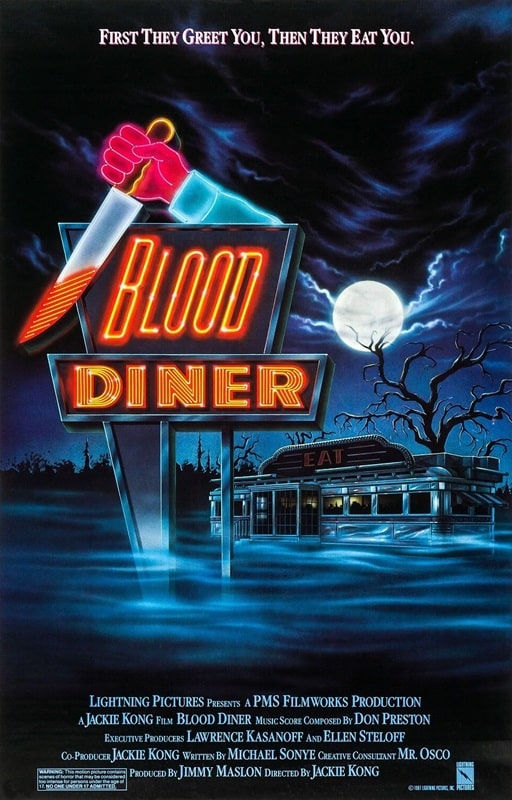
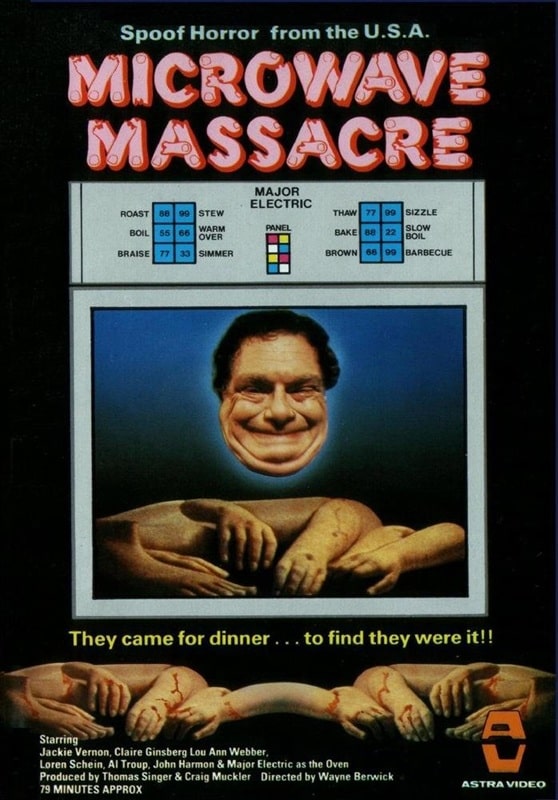
Blood Diner (Lightning Pictures, July 10, 1987)
and Microwave Massacre (Reel Life Productions, 1979)
Regrets, I’ve had a few. Usually after watching a sharksploitation film full of bad actors. However, the only regret I have after watching this stunningly bonkers horror comedy from Jackie Kong, is that I didn’t see it in 1987, thus depriving me of 36 years of annual re-watches.
I’m not sure how she did it, but Kong tapped into the under-developed brain of a 14-yr-old boy and made the perfect film.
It’s ludicrous, gory, offensive, daft as a badger on a hang glider, and quite brilliant — I wholly get why it has achieved such a cult status.
The abysmal acting is just the icing on the cake in this story of a couple of dumb brothers trying to resurrect an ancient, evil goddess by murdering women and using their internal organs in a ritual. All other body parts are served in their diner. As is befitting a mid-80s horror romp, this is full of nudity, sexism, practical dismemberments, and banging tunes.
Highlights include a deep-fried head, a funk band brass section dressed as Hitler, a brain in a jar, death by stalactite, an exploding quiff, an extremely long sequence of someone getting repeatedly run over, someone in a Ronald Reagan mask shooting up a studio full of topless cheerleaders, and the perviest detective you’ll ever meet.
It’s Texas Chainsaw Massacre meets The Naked Gun.
Insane.
10/10
Microwave Massacre (1979)An oddball flick, this does tangentially feature a microwave, but no massacres. To be honest, I’m still coming to terms with whether or not I enjoyed it. The film is supposed to be a farce, but its humor is neither insightful, nor funny. If anything, it plays like an early 70’s smut flick on quaaludes. The acting is amateur at best, and the women are portrayed in only two ways, sexual playthings, or screeching harpies. All are eaten though. The lead character, Donald, is played by Jackie (Frosty the Snowman) Vernon in the most laid back style I have ever witnessed. It’s as if he had just wandered into each scene and someone whispered a line to him, which he would repeat with zero emotion. All very strange, even more so when he turns to camera and just stares at us.
The horror elements are fairly cheesy, as are the nudity scenes (although the first one we get is more disturbing than cheesy), but the ACME Rubber Hand Co. must have made a killing that year.
One for true purveyors of weird stuff.
5/10

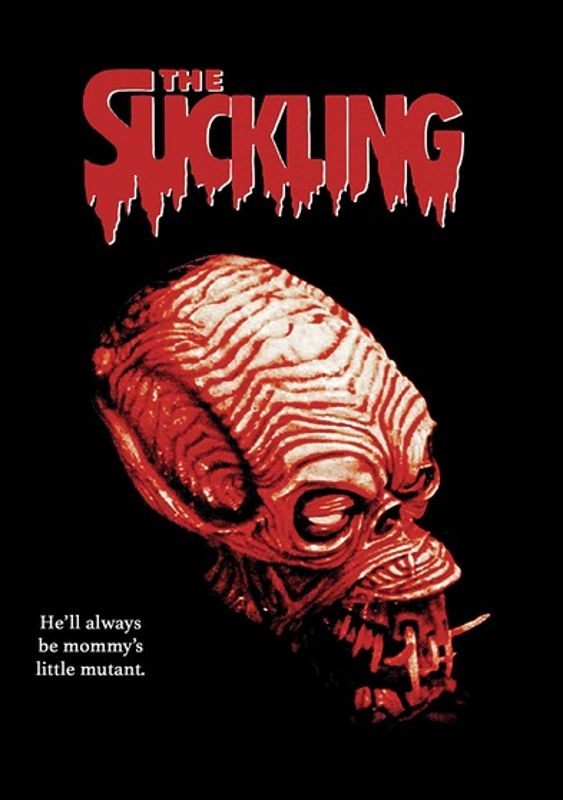
The Shout (Rank Film Distributors, June 16, 1978)
and The Suckling (Hypercube, September 24, 1990)
It’s a funny old world, ain’t it. How a film slips by a purveyor of horror, especially British horror, like myself never fails to intrigue me — yet here we are.
The Shout is not only based on a short story by Robert Graves, but it won a top award in Cannes that year, is a classic bit of British Folk(ish) horror in the same vein as The Wicker Man, and it had eluded me all these years. Now, thanks to Tubi’s unrivalled collection, I have finally seen it, and it’s staggeringly good.
It helps that you got the likes of Alan Bates (at the height of his dangerously sexy period), John Hurt, Susannah York, and every excellent English character actor including fresh-faced Tim Curry and fresher-faced Jim Broadbent in the cast. The story is fairly bonkers — a stranger (Bates) inserts himself into the cozy cottage life of Hurt and York, and proceeds to take over, cuckolding Hurt and claiming York through aboriginal sorcery. Yep, aboriginal sorcery. Apparently he had lived in Australia for 18 years, fallen in with an aboriginal shaman, and learned some dark magics, not least of all the ability to kill a person with a single shout.
The story is bookended by a cricket match between the inmates of an asylum and their carers, and the characters are all connected by this strange game.
It also helps that the exteriors were all shot in Devon, and that the direction and editing are super-interesting, bordering on experimental. The director, Jerzy Skolimowski, wisely keeps many events in the film ambiguous, keeping the viewer on their toes and questioning everything.
Highly recommended if you like 1970s British horror, or modern-day equivalents by the likes of Ben Wheatley, Ari Aster or Robert Eggers.
10/10
The Suckling (1990)Take a look at the official synopsis, and then decide if you want to carry on reading:
When a pregnant woman goes to an illegal abortion clinic doubling as a brothel, her aborted mutant fetus sets out on a violent rampage.
Still here?
Yes, this one is offensive as all hell. The premise is barking mad, the acting is dire (more on this later) and the direction is all wrong, and yet… and yet I found myself laughing so much at this film that I’m loath to give it a bad score, even though it deserves it. The laughs, of course, were unintentional and only caused by terrible lines and delivery of said lines. About 15 minutes in, I suddenly realized why I was enjoying it so much; it’s like a feature-length episode of Garth Marenghi’s Dark Place — there’s even an actor who not only looks like Richard Ayoade, but delivers his lines exactly like Dean Learner.
The fast-growing fetus monster is a slightly goofier version of Rawhead Rex (if that’s possible), and the actual kills are mostly off-screen — I can’t help wondering if this was an edited version I saw.
A particular highlight is the foley added to the film. Every object, ceiling fan, footstep, and door kick is given a loudly incorrect sound effect — you have to watch it just for this.
Bottom line — it’s terrible, awful acting, ridiculous premise, silly fx.
Highly recommended.
6/10
Previous Murkey Movie surveys from Neil Baker include:
Tubi Dive, Part I
What Possessed You?
Fan of the Cave Bear
There, Wolves
What a Croc
Prehistrionics
Jumping the Shark
Alien Overlords
Biggus Footus
I Like Big Bugs and I Cannot Lie
The Weird, Weird West
Warrior Women Watch-a-thon
Neil Baker’s last article for us was Part I of Tubi Dive. Neil spends his days watching dodgy movies, most of them terrible, in the hope that you might be inspired to watch them too. He is often asked why he doesn’t watch ‘proper’ films, and he honestly doesn’t have a good answer. He is an author, illustrator, teacher, and sculptor of turtle exhibits. (AprilMoonBooks.com).
Don’t Go into the Nursery! 6 Haunting Novels with Scary Children
If you are looking for a chilling read that will make you question the innocence…
The post Don’t Go into the Nursery! 6 Haunting Novels with Scary Children appeared first on LitStack.
Junkyard Cats - Book Review
 Junkyard Cats (Junkyard Cats #1)by Faith Hunter
Junkyard Cats (Junkyard Cats #1)by Faith HunterWhat is it about:After the Final War, after the appearance of the Bug aliens and their enforced peace, Shining Smith is still alive, still doing business from the old scrapyard bequeathed to her by her father. But Shining is now something more than human. And the scrapyard is no longer just a scrapyard, but a place full of secrets that she has guarded for years.
This life she has built, while empty, is predictable and safe. Until the only friend left from her previous life shows up, dead, in the back of a scrapped Tesla warplane, a note to her clutched in his fingers - a note warning her of a coming attack.
Someone knows who she is. Someone knows what she is guarding. Will she be able to protect the scrapyard? Will she even survive? Or will she have to destroy everything she loves to keep her secrets out of the wrong hands?
What did I think of it:I was warned by a friend that this was a weird series, still I was curious enough to give it a try.
And I what she meant.This is a futuristic world with lots of freaky stuff, so if you're not into freaky science SciFi skip this series.
Still, I had a good time with this book.There was a bit too much fighting at times. I would have liked it better if there was a better balance between the tense action and more relaxed moments.But all in all this was an interesting and intriguing read. I really liked Shining and her employee/friend Matteo. And of course there are the junkyard cats!
There is a lot going on and explained in this book, and maybe Hunter chose to get in so much action to make all the explaining less boring (which it wasn't imo).By the end it's clear what Shining's next step will be, and I will get my trotters on the next book to see where this whole series will lead to.
Why should you read it:It's an intriguing Futuristic Read.
Women in SF&F Month: The Essential Patricia A. McKillip Cover Reveal
For Women in SF&F Month today, I’m revealing the cover of The Essential Patricia A. McKillip—and giving away two galleys of the 30th anniversary edition of her fantasy novel The Book of Atrix Wolfe! This is an honor since I love her writing, from the magic and beauty of her prose to the wit and wisdom that shines through her stories. She is the author of two of my favorite novels, The Changeling Sea and The Forgotten Beasts of Eld, […]
The post Women in SF&F Month: The Essential Patricia A. McKillip Cover Reveal first appeared on Fantasy Cafe.The Inheritance: Chapter 1
Warning: R rated for fantasy violence and adult themes.

We are at war.
This war is not about wealth, resources, or territory. It’s a war of biological extermination. The very existence of humanity is at stake.
The moment the first gate burst, sending a monster horde to rage through our world, it brought us unimaginable suffering, but it also awoke something slumbering deep within some of us, a means to repel and destroy our enemy. Powers beyond comprehension. Abilities that are legendary.
The war is ongoing. If you are a Talent, your country needs you. The world needs you. Be the hero you always wanted to be.
Take my hand and answer the call.
Elias McFeron
Guildmaster of Cold Chaos
Chapter 1Health insurance with $1,000 maximum family deductible.
Prescription drug coverage with 80% discount off list prices.
The first time I heard about gates, I imagined them to be these portals glowing with a magical blue light. Too many video games, I guess. They were nothing like it. This one was a hole. A deep, black, vertical hole that punched through reality, swirling with pale mist.
It appeared in front of the Elmwood Park Rec center. To the left was Elmwood Public library, all red brick and tinted windows. To the right was a funeral home followed by perfectly ordinary, three-story boxes of apartment buildings covered in tan stucco. And straight ahead was an interdimensional tear. Just another Monday.
If someone told me ten years ago that I would be standing in front of a hole leading into a dimensional breach and preparing to go inside, I would’ve politely nodded, walked away, and later told Roger I’d met an unhinged person. Of course, ten years ago I was thirty, happily married, with a daughter in elementary school, a son just out of diapers, and a low-risk private sector job I loved. A different life that belonged to a different Adaline.
The future looked bright back then. Until the invasion shattered it.
Free emergency medical care when injured in the line of duty.
I took this job for the benefits, and when it got to me, like now, I recited them in my head like a prayer.
Dental, $150 deductible, 50% off braces.
Things that came with age and children: appreciation of the dental plan with orthodontics. Braces were hellishly expensive.
Vision plan, 15% discount off glasses and contacts.
The gate gaped like a dark maw.
At least thirty-five yards tall. Maybe taller. The threat scale ran from blue to red, and the prep packet put this gate at the low orange risk level. On a dying scale of 1 to 10, it was about 7.
This was my seventy-eighth gate. I’d gone into orange gates many times before. I didn’t want to go into this one. It made my hair stand on end. And the presence of the funeral home wasn’t helping.
“Ominous sonovabitch, isn’t he?” Melissa murmured next to me.
“Mhm.”
The mining foreman crossed her arms on her chest. She was a tall woman, two years older than me, with auburn hair she religiously dyed every four weeks and the kind of face that said she had everything under control. We met years ago, on one of my earlier gate dives, bonded over kids, and stayed friendly ever since.
Melissa ran her mining crew like a well-oiled machine. She didn’t get rattled, but she was staring at this gate like it was about to reach out and bite her. Something about this hole set both of us on edge.
Melissa narrowed her eyes. “Anja, tie your damn shoelaces.”
One of the younger miners rolled her eyes and crouched. “Always on my case…”
“Exactly. I am always on your case. I’m on everyone’s case. If we have to run for our life out of that gate, I don’t need any of you tripping over your feet, because I’ll have to double back and get you. You have two toddlers to come back to.”
“Yes, Mother.”
Melissa heaved a sigh. “Everybody is full of sass today.”
Around us the mining crew checked their gear, twelve people in indigo magnaprene coveralls and matching hard hats. Nobody seemed unusually worried. Toolbelts were adjusted, rock drills and shears tested, the generator and floodlights on three industrial carts inspected. The usual.
The escort, five combat grade Talents in dark blue tactical armor, had done their precheck ages ago and were now waiting. Aaron, a tank class, sat on a crate, leaning against another crate, his eyes closed. His massive adamant-reinforced shield rested on the ground next to him. Three strikers mulled about, armed with SIG Spear rifles and a variety of sebrian blades for when the ammo ran out.
London, the escort unit leader, surveyed the mining crew. He was a blade warden, which meant he could both dish out lethal damage and summon a protective forcefield which made him invulnerable for several minutes. He carried a brutal-looking tactical axe, and on the few occasions I saw him use it, he cut through transdimensional monsters like he was chopping salad.
Both the mining crew and the escort wore blue, marked with the lightning blade emblem of the Cold Chaos Guild. I wore a white hard hat and grey coveralls with a patch of Dimensional Defense Command on my sleeve. The mining crew and the escorts were private contractors, while I was a representative of the US Government. My official title was Dimension Breach Resource Assessor. The guilds called us DeBRAs, and they were supposed to keep us alive at all costs.
If things went to shit, the tank would put himself between the mining crew and the threat, the strikers would cut down whatever got past him, and London would grab me, wrap us both in his defensive force field, and drag me out of the gate so I could report the disaster to the DDC. Of everyone here, I was the least expendable, as far as the government was concerned.
It didn’t make me feel any better.
The mist swirled, sending tendrils of dread toward me. I resisted the urge to hug myself.
20 days of recuperation leave.
Which was long overdue. Maybe that was part of the problem.
Basic Housing Allowance.
That was a big one. BHA was the only reason I was able to keep the house after Roger left.
Child Tuition Assistance.
CTA was another big one. It helped me cover tuition for Hino’s Academy. Things were tight but I hadn’t missed a payment yet. The school had stellar academics, but I picked it for their underground shelter. If a gate ruptured and a flood of invading monsters washed over the city, Tia and Noah would be safe until the military and the guilds repelled it. Competition for the school was fierce, but since I was DDC, the kids were given special treatment along with the children of guild members. Advertising that Hino was the school of choice for the children of Talents was good for the academy’s prestige.
“Ada, London is checking you out again,” Melissa said.
Next to me, Stella, Melissa’s baby-faced protégé, snickered quietly. She was twenty, and flirting was still exciting.
A large German Shepherd sitting at Stella’s feet panted as if laughing. Bear came from an illustrious line of police dogs with heroic careers. She had the typical GS coloring, big brown eyes, and huge ears, and petting her was off-limits. I’d asked before and was told no. Bear was working like the rest of us. Petting would be distracting.
“Brace yourself, he’s coming this way,” Melissa murmured.
I turned. London was heading straight for us. His real name was Alex Wright, and he was from Liverpool, but everyone called him London anyway. People with combat talents were resistant to wear and tear, and at forty-five, London was still in his prime, tall, broad-shouldered, with blue eyes, wavy brown hair, and an easy smile. His job was to keep the miners and me safe, and since he was my designated babysitter, he and I spent a lot of time in close proximity. Even so, he’d been paying me too much attention lately.
London stopped by us. “Everything okay here?”
“Everything was fine until you showed up,” Melissa said.
He grinned at her. “Just doing my due diligence.”
They usually had a fun back-and-forth going. It put people at ease. I worked with guilds all over the Eastern US. In some mining crews, tension was so thick you could cut it with a knife and make a sandwich. Cold Chaos was light and bright.
“Are you worried about us, Escort Captain?” Stella tilted her head, and her mane of dark curly hair drooped to one side.
“It’s my job to worry, Miles. Have you been doing your sprints?” London asked.
“I have,” Stella told him. “Fifteen seconds for the dash.”
A hundred meters in fifteen seconds was damn impressive. It was good to be young. God, I was almost twice her age. How the hell did it even happen? I was twenty only a few years ago, right?
“Not bad,” London said.
“I can beat both of them,” Stella reported, nodding at me and Melissa.
“Talk to me after you pushed three human beings through your hips and put on forty pounds from the stress of keeping them alive,” Melissa told her.
London turned to me. “Where do you dash, Ada?”
Why are you doing this? You know nothing will come of it. “Gate Park.”
All government gate divers ran – not for distance or endurance – but to survive. A 100-meter sprint, a walking lap around the track, rinse and repeat for an hour, then go home, and take ibuprofen for the aching knees. Three times a week. Five would be better, but three was what I usually managed. DDC had mandatory PT tests every six months to keep us in shape. When a noncombatant faced a threat in the breach, running to the gate was the best and often the only way to stay alive.
“Maybe I’ll join you sometime,” London said.
Again, why? “You’re out of my league. It would be a waste of your time.”
“Never,” he told me.
“How fast do you dash?” Stella asked London.
“Let me put it to you this way: I could pick Ada up and give you a three-second head start, and you still wouldn’t beat my time.”
London smiled at us and moved on.
“Is he lying?” Stella asked Melissa.
“No,” the mining foreman told her. “Combat Talents are on another level. We can’t keep up.”
London was sending out all sorts of interested signals. He was nice to look at, charming, and he’d clearly been around the block enough to know what he was doing. By now, he’d had enough experience not to fumble and enough patience to pay attention when it mattered. If I agreed to go on a date, it would go smoothly and end well.
However, the DDC forbade fraternization with guild members. I was supposed to stay neutral and refrain from forming any personal attachments. Even the work-hours friendships like the one with Mellissa were frowned upon. Getting involved with a guild Talent would get me fired, and I had two kids and a mortgage. As fun as London would be in bed – and he would be very fun – he wasn’t worth losing my job.
My phone vibrated. Hino Academy. Please don’t be a problem, please don’t be a problem…
“Yes?”
“Ms. Moore?”
Gina Murray, the assistant principal. That wasn’t good.
“We have a problem.”
Of course, we do.
A woman emerged from the gate and waved. A scout the assault team had left behind. An hour had passed without incident, and it was time to go in.
“Alright people!” London called out. “You know the drill. Last gear check. Move out in two minutes.”
“What happened?”
I needed to fix this fast. Phones didn’t work inside the gate, and London had to stick to schedule and account for any delay. If we went inside five minutes late and a disaster struck, even if it was completely unrelated, the Guild would drag him over hot coals for it.
“Tia left campus without permission.”
Melissa rolled her eyes.
“Okay.” What was that kid doing…
“Before she left, several students and a member of the faculty heard her make a self-harm threat.”
“What?”
“We are required to contact the police…”
“Please don’t do anything. Let me speak to her first. I’ll call you right back!”
I ended the call and stabbed Tia’s number in contacts.
Beep.
She wouldn’t. Tia wouldn’t. Not in a million years.
Beep.
Beep.
I knew my daughter. She would not.
“Yes, mom?”
“Are you going to hurt yourself?”
“What?”
The mining crew formed up in front of the gate. London gave me a pointed stare.
“Oh look, Stella’s dog is malfunctioning,” Melissa said too loud.
Stella pretended to shake Bear’s leash. “Won’t turn on. Something broke.”
London headed for us.
“The Academy called. You told them you were going to hurt yourself and left campus.”
“Well, you know what, maybe I should kill myself because they just assigned us a fifth essay due next week…”
“Tia!” I couldn’t keep the pressure from vibrating in my voice. “This is really serious. I need you to be honest with me. Are you thinking of hurting yourself?”
London cleared the distance between us. “What’s the hold up?” he asked quietly.
“Give her a minute,” Melissa told him. “It’s her kid.”
“No. I was in the cafeteria, I failed Latin again, and then there was the fifth essay due…”
London met my gaze. “Three minutes.”
Thank you, I mouthed. Three minutes was a gift.
“…Mr. Walton made a snide comment about not applying myself and I said, ‘Just kill me, it will solve all my problems…’”
And…?
“…And then I went to get Starbucks! I always sneak out to get Starbucks. Everybody does it. Nobody cares!”
It wasn’t a real threat. Someone overreacted. The relief washed over me like an icy flood. Not a real threat.
“Mr. Walton hates me!”
“Tia, I’m about to go into the gate. The school wants to call the cops.”
“What? Why?!”
“If this happens, things will get very complicated, and I can’t help, because I’ll be inside the breach. I need you to return to school and fix this.”
“I was already on my way! I’m almost there.”
I started toward the gate.
“I’m walking into the school building right now.”
“Kiss their ass, do whatever you need to, but make sure you fix it. I love you.”
“I love you too. Mom…”
The gate loomed.
“Here we go,” Melissa muttered.
“I have to go, Tia.”
“Mom!”
“Yes?”
“Don’t die!”
“I won’t,” I promised.
“Remember,” London called out. “We go in together as one, we come out together as one. Nobody gets left behind.”
The mist swirled around my legs. I hung up, took a deep breath, and stepped into the dark.
#

Stepping through the gate felt like trying to push your way through dense, rubber-thick Jello.
I blinked, trying to adjust to the low light.
A stone passage stretched in front of me, illuminated by patches of bioluminescent lichens, moss, and fungi. They climbed up the walls, glowing with turquoise, green, and lavender, some curling like fern sprouts, other spreading in a net like bridal veil stinkhorn mushrooms.
The otherness slapped you in the face. It didn’t look familiar, it didn’t smell right, and it didn’t feel like home. The hair on the back of my neck rose. Fear dashed down my arms like hot electric needles. I wanted out of this gate. The urge to turn around and run back to the familiar blue sky was overwhelming.
This burst of panic used to happen every time I entered a breach. I’d tried everything in the beginning: counselling, breathing, counting, cataloging random things I saw… My primary prescribed some Xanax, which I couldn’t take because it was strictly off limits for gate divers. Slowed the reaction time down too much.
Medication wouldn’t have worked anyway. Nothing had worked until one week we got a cluster breach. Four gates opened simultaneously in close proximity, and I was the only DeBRA in range. I went through four breaches in forty-eight hours, and by the middle of the third my panic switch got permanently broken. This anxiety was an unwelcome blast from the past, and it needed to go away right now.
It was probably the residual stress from the school call.
“Alright,” Melissa called out. “We have a limestone cave biome. The assault team found a large chamber with promising mineral deposits, so we’ve got a bit of a hike. Watch your step. Do you remember how Sanders fell into a crevice and got stuck, and we spent ten minutes pulling him while he was farting up a storm and giggling? Don’t be Sanders.”
Sanders, a tall bear of a man in his mid-thirties, chuckled into his reddish beard. “I didn’t have chili this time, I swear!”
A light laughter rippled through the crew. Melissa was going right down her playbook: item one, put everyone at ease the moment the crew stepped into the breach; item two, reach the mining site; item three, profit.
“We have Adaline Moore with us this morning. She is the strongest DeBRA in the state, which means if there is good pay in this hellhole, she will find it for us,” Melissa announced. “Another day, another dollar. Isn’t that right, Assessor?”
“That’s right.” I matched her tone. “Living the dream.”
Another ripple of laughter.
“Once more…” one of the miners called out.
“Don’t you say it!” Melissa growled. “You know better!”
“…into the breach!”
“Damn it, Hotckins!”
The guild superstition held that if you said the line, you would come out alive, but you would kiss the chance of a big score goodbye. It didn’t matter. Someone always said the line.
“I swear if you jinxed us, I will fire you myself…”
Aaron looked at London. The blade warden nodded, and the massive tank started down the passageway, moving fast. Time was money. The mining crew followed, keeping the three equipment carts in the middle, the strikers guarding the flanks like border collies obsessed with their herd.
I joined the flow of people. Melissa walked on my left and London on my right. Elena, the assault team’s scout who’d come back to escort the miners, fell in step next to London. Lean, with a harsh face and blond hair pulled into a tight ponytail, Elena didn’t walk, she glided.
In theory, being on the mining crew was the safest part of the gate dive. Safe was a relative term. Walking across a narrow beam over molten lava was also safe, as long as you didn’t fall.
“Doing okay?” London murmured.
“Yes,” I lied.
“Is Tia alright?”
“Yes. She’s a smart kid. She will handle it. Thank you for the three minutes.”
“You’re welcome.” He glanced at me, his eyes concerned. “Not feeling this one?”
“No.”
Gate divers were like ancient sailors. We ventured into the unknown that could kill us at any moment. In the breach, survival depended on luck and intuition, and our rituals were an acknowledgment of that. We knocked on wood, we muttered lucky sayings under our breath, and we trusted our instincts. My instincts were pumping out all of the dread they could muster.
“Anything specific?” London asked.
“It makes my skin crawl.”
“Don’t worry,” he promised quietly. “I’ll get you out of here in one piece.”
I glanced at him.
“I mean it, Ada. The only way you go down is if I’m down, and I’m really good at surviving. We get in, get out, and you can go home and sort the kid issues out. Tomorrow will be like this never happened.”
“Thank you.”
He nodded.
Ten years had passed since Roger had abandoned us. I’d been on my own for a decade, taking care of the kids, paying the bills, surviving. Every decision in my life was up to me, and I made them without support or any help from anyone else. I’d become used to it, but London just reminded me how it felt to share all of that with someone. Someone who cared if you lived or died.
This was the worst time to wonder about things. I promised my daughter I would come back. I had to concentrate on that.
The passageway forked. We turned right. Hotchkins, a short, dark-haired man, spraypainted a backward orange arrow on the wall. He would do this every time we made a turn. It was a proven fact that people running for their lives had trouble orienting themselves.
Ahead a glowing stick shone among the rocks. Beyond it eight furry bodies sprawled on the ground in a puddle of blood. My foot slid on something. A spent shell casing. The cave floor was littered with them. The assault team had made a stand here.
We passed the bodies, skirting them to the sides. The dead things were large, about the size of a Great Dane, with long lupine jaws and massive feet armed with hook-like claws. Their pelts, chewed up by bullets, were shaggy with blue-grey fur. They didn’t look like anything our planet could’ve spawned.
“A variant of Moody’s stalkers,” London said. His voice was perfectly calm.
“Yeah. There were a lot of them, and they are spongy. They soak up bullets like they’re nothing and keep coming,” Elena said. “And they spit acidic bile.”
“Good to know,” London said.
“We did our best to clean up, but the place is a maze.” Elena kept her voice low. “Passages going everywhere, so we may run into some. We didn’t see anything more advanced until we went much deeper, so there is that.”
“No worries,” Stella offered from behind them. “Bear will let us know if anything is coming.”
Elena gave her a cold smile. “I will let us know if anything is coming.”
“Don’t pay her any attention, Bear,” Melissa murmured. “She didn’t mean anything by it.”
Bear twitched her right ear. One day I would pet that dog.
Elena kept gliding forward, her face portraying all of the warmth of an iceberg. Her talent was heightened hearing and vision, which put her into scout class. If she concentrated hard enough, she could hear a person murmuring behind a closed door two floors above. But as awesome as Elena was, I would trust Bear over her any day. There was a reason every guild brought canines into the breaches. The transdimensional monstrosities wigged them out, and they let us know when something came near. Dogs were the best early warning system we had.
Elena was a young scout. Her talent had manifested two years ago, and she was still in the edgy, prove-yourself stage. More experienced scouts made friends with canine handlers and carried dog biscuits.
At least she was conscientious and took her job seriously. Some combat Talents looked down on miners. As I heard one hotshot put it, “We’re going to kill monsters and save humanity. Have fun digging up magic rocks.” He was very surprised when he didn’t get his bonus at the end.
Magic rocks assured everyone’s paychecks and produced resources for weapons and armor. Mining crews had to be protected at all costs, and both mining foremen like Melissa and escort captains like London held a lot of sway in the guilds. Without mining, guilds would not exist.
Ten years ago, when the first set of gates appeared out of nowhere near the major population centers, they’d taken humanity by surprise. We’d cordoned them off so we could carefully study them and before anyone had a chance to adjust, the gates burst, spilling a horde of monsters into the world.
We knew a lot more about the gates now. Beyond every gate lay the breach, a miniature dimension stuffed to the brim with monsters. That dimension connected Earth and the hostile world like a gangplank linking two ships. The breaches were how the enemy got from their world to ours.
Every breach had an anchor, a core that stabilized it. Once the breach appeared, the anchor began to accumulate energy. When it got enough, the gate would burn through the fabric of our reality and rip open, releasing the invaders into our world to rampage and murder everything they came across. The more dangerous the breach was, the longer it took to burst.
There was a brief period, anywhere from a few days to a few months from the moment the gate appeared, when the monsters couldn’t escape yet but we could enter the gate from our side. It gave us a chance to extinguish the anchor and collapse the breach. The moment a gate manifested, the clock started ticking.
At first, destroying the anchors was the sole responsibility of the military, but it quickly got prohibitively expensive. Casualties were high. And it was discovered that the breaches contained a wealth of materials: strange ores, medicinal plants, and monster bones with incredible properties. Resources that could aid our fight and make us stronger. It wasn’t just about destroying the anchors anymore. We had to strip the breach of anything valuable before it collapsed.
Pretty soon it became apparent that the very first gate rupture altered the world. Some said the gates released a virus, others speculated that it was some undetectable trace element that entered the atmosphere. Nobody knew for sure, but in some people it awakened the kind of abilities that previously only existed in myth and fiction. The Talents. Faster, stronger, almost magical.
The Talents banded into guilds, and governments around the world began to outsource the gates to them, taking a percentage of the profits. Economic and security crisis solved at the cost of volunteer lives.
The cave passage kept branching. Left, left, right, another right, each glowing with swirls of colorful lichens and fungi. Elena was right. This place was a maze.
By now, the process of gate diving was almost routine. As soon as a gate appeared, it was graded, its threat level measured, a government assessor like me assigned, and the appropriate guild was contacted. The attack began with the assault team, heavy hitters with combat talents, who entered the gate and cut and burned through the miniature pocket dimension until they found the anchor and destroyed it.
While the assault team worked their way to the anchor, the mining crew came in and stripped the breach bare, extracting anything that could be of use and would help humanity keep fighting. Each breach’s resources were unique and precious. That was where I came in. My job was to assess the space, guide the mining team, and make sure that the government got their 30% cut.
Once the anchor was destroyed, the breach began to degrade and then collapsed, usually within twenty-four hours. Hopefully everybody got out alive, and when the next gate appeared, we would do it all over again.
Ahead Aaron stopped. Finally. It was time to earn my paycheck. The sooner I found something of value, the sooner we all got out of here.
Dread curled around me like a cold snake. I could just turn around and run back to the gate, quit, and never go into any breaches again. I could absolutely do that. But then whatever this breach held would stay in it instead of becoming weapons, armor, and medicine.
I took a deep breath and followed the miners to do my job.
To be continued on Monday.
We are looking for an artist to help us with images. Somebody who is good at quick digital sketches of environments, mostly caves. Contact Mod R with your portfolio at modr@ilona-andrews.com
The post The Inheritance: Chapter 1 first appeared on ILONA ANDREWS.
Tor Doubles: #2 Greg Bear’s Hardfought and Timothy Zahn’s Cascade Point
 Hardfought cover by Tony Roberts
Hardfought cover by Tony RobertsCascade Point cover by Tim White
This Tor Double has the distinction of containing two stories which were both nominated for the Hugo for Best Novella in 1984. Zahn beat out Bear for the rocket, as well as works by Hilbert Schenk, Joseph H. Delaney, and David R. Palmer. Bear wouldn’t go away empty-handed, however, since his story “Blood Music” won the Hugo for Best Novelette that same year (beating out works by Kim Stanley Robinson, George R.R. Martin, Connie Willis, and Ian Watson). Published in November of 1988, the cover for Hardfought was painted by Tony Roberts. The cover for Cascade Point was painted by Tim White.
Cascade Point was originally published in Analog in December, 1983. It won the Hugo Award for Best Novella. The story placed second in the Locus poll and the Analog Readers Poll.
Pall Durrikan is the captain on a interstellar cargo ship. Although he and his crew mostly moves cargo between planets, they also take on passengers to help cover costs and turn a profit. In order to make the trip between distant stars, they must navigate through “cascade points,” essentially jumps in hyperspace. Because of the psychological issues the occur…seeing a cascade of images of yourself that appear real…anyone who isn’t required to be awake during the jump is given sedatives to keep them asleep. On more upscale spaceships, an autopilot is installed, but the Aura Dancer, Durrikan’s ship, doesn’t have one of those, so Durrikan, or one of his crew, must stay awake during the jumps.
Early in the novella, Zahn explains that there are eight passengers on the Aura Dancer, but he only really introduces two of them, Rik Bradley and Dr. Hammerfield Lanton. Lanton is a psychiatrist who is treating Bradley for mental illness bordering wit dissociative personality issues. Since Lanton and Bradley are the only passengers introduced, it is clear that they will become important later in the story. Zahn’s decision not to introduce the other characters indicates that the human factor will be less important to the story than the technical issues that will be faced.
Despite this, and Zahn’s focus in on the narrator-Captain, he makes it clear that there is more going on the ship that the Captain sees. Alana is building a relationship with Bradley, although it mostly occurs outside the main narrator, the Captain sharing it with the reader through his perceptions of Alana. Similarly, although Lanton describes his treatment of Bradley during the Cascade Points, the reader never experiences that treatment directly. The other passengers, and most of the crew, are even less germane to the story and barely register.
Cascade Point is a puzzle story. Zahn has set up the rules for his universe and then tweaks them to make things go awry. He hints at the puzzle early in the story with references to ships that have gone missing during their jumps between stars. When the crew of the Aura Dancer finds themselves in a strange place, the puzzle begins to offer a solution. For the reader, the issue is that Zahn has created the situation and holds all the cards. He can make changes to the rules under the guise that the characters have an incomplete understanding of the way their universe works. Cascade points are used, but not entirely understood. Ming metal is known to impact the passage through cascade points, but only in an imperfect way.
The story does include several interesting ideas, including Lanton’s attempt to use the cascade points, which some believe to show images of the individual in alternative timelines, to treat Bradley’s neurosis, although Durrikan questions the concept and isn’t particularly happy about the idea of Bradley and Lanton remaining awake throughout the jumps. Unfortunately, told from Durrikan’s point of view, Zahn is limited in how far he can follow up any of those subplots, focusing only on how they impact the Aura Dancer and the fate of the passengers and crew overall. While the mysteries that crop up about the cascade points are interesting, it feels like there is a lot more happening that the reader isn’t privy to.
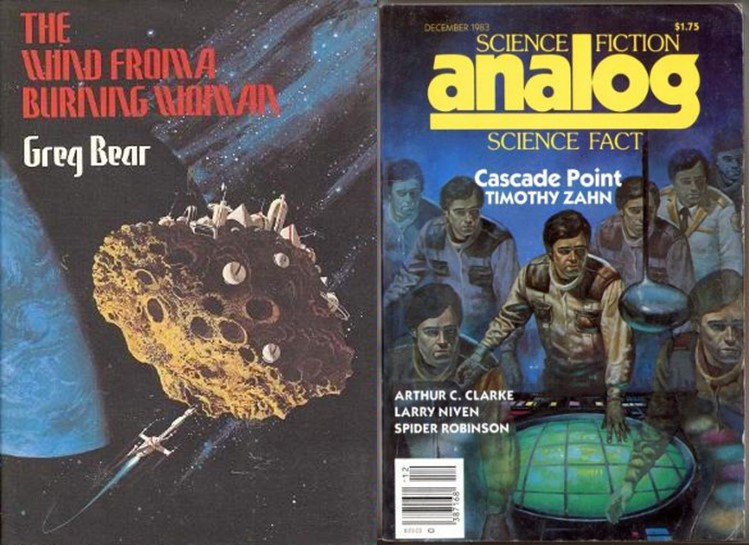 The Wind from a Burning Woman cover by Vincent di Fate
The Wind from a Burning Woman cover by Vincent di FateAnalog cover by Doug Beekman
Hardfought was originally published in Isaac Asimov’s Science Fiction Magazine in February, 1983. It was nominated for the Hugo Award and Nebula Award, winning the latter. It placed fifth in the Locus poll and second in the Science Fiction Chronicle Readers Poll.
John W. Campbell, Jr. was quoted as asking his writers to “Write me a creature that thinks as well as a man or better than a man, but not like a man.” In Hardfought, Greg Bear not only responds to Campbell’s challenge with the creation of the Senexi, an ancient star-faring race, but also with the creation of humans, who bear little resemblance to our own race. Layering these two creations under a lexicon which Bear does not offer to define, but the reader must learn from context, Hardfought provides a hard science fiction story which rewards the careful reader and is likely to leave the casual reader perplexed.
Bear flips back and forth between two protagonists in the story, the Senexi Aryz and a human Prufrax, although it isn’t entirely clear she is human except that Bear has applied that name to her. Her way of thinking and acting certainly feels as alien as anything Bear describes for Aryz. It is clear that the two cultures are at war with each other, but the details of the war, as well as Aryz and Prufrax’s roles in the battle are esoteric.
As with much science fiction, the patient reader is rewarded. It becomes clear that part of the reason for the war is that although the two races are different enough that they should be fighting over the same pieces of real estate, one of the issues is that they come from very different periods in the universe’s evolution. The Senexi are an ancient race, dating to practically moments after the creation of the universe. The Humans are a later race, evolving billions of years after the Senexi. The battle between the two sides is (partly) a generational issue. But even that is too simple an explanation for what is happening between the races.
In addition to the reasons for the war, Bear explores the psychology of the two races. The Senexi have a sort of brood mind with the soldiers like Aryz filling the role of a “branch ind,” clearly based on, but not entirely analogous to the society of bees on earth. The branch inds view themselves as completely expendable, but at the same time they take pride in their roles and seek to serve the brood as successfully as possible.
The humans, as seen by Prufrax, are not the individuals that we usually associate with humans and she seems to be almost a construct who is regenerated to fight as needed, her memories flashing back throughout the story. It is only slowly that her true situation comes to light and causes the reader to reëvaluate the entire story.
Bear is known as a writer of hard science fiction, and Hardfought certainly falls into that category, but it is also reminiscent of the sort of mind-bending concepts that can be found in the works of Samuel R. Delany or Gene Wolfe. Like those authors, and more than other works by Bear, Hardfought is a story which takes on deeper meaning the more time the reader gives to it, both in the reading and in the thinking about it.
While Bear (and other hard science fiction authors) often invents new science to allow himself to explore the worlds he has created, in Hardfought, Bear creates new civilizations and vocabulary, and trusts the reader to be able to figure everything out from context rather than attempting to explain what he is doing and what is happening.
The two hard science fiction stories in this volume of the Tor Doubles series both come from the same tradition, but they arrive in very different places. Zahn’s story is more traditional, and offers the reader its own twists and turns, while Bear’s tale is a much more complex and challenging exploration of the ethics of warfare and civilization.
 Steven H Silver is a twenty-time Hugo Award nominee and was the publisher of the Hugo-nominated fanzine Argentus as well as the editor and publisher of ISFiC Press for eight years. He has also edited books for DAW, NESFA Press, and ZNB. His most recent anthology is Alternate Peace and his novel After Hastings was published in 2020. Steven has chaired the first Midwest Construction, Windycon three times, and the SFWA Nebula Conference numerous times. He was programming chair for Chicon 2000 and Vice Chair of Chicon 7.
Steven H Silver is a twenty-time Hugo Award nominee and was the publisher of the Hugo-nominated fanzine Argentus as well as the editor and publisher of ISFiC Press for eight years. He has also edited books for DAW, NESFA Press, and ZNB. His most recent anthology is Alternate Peace and his novel After Hastings was published in 2020. Steven has chaired the first Midwest Construction, Windycon three times, and the SFWA Nebula Conference numerous times. He was programming chair for Chicon 2000 and Vice Chair of Chicon 7.
Comment on Easter Update by Bill
Thanks for the update and glad to hear that Book#4 is well under way, even if progress isn’t as fast as you’d like.
Looking forward to Essentia Capacity and if age or training can increase it for Stephen, even if only by a little…
Will the November release date for Book#3 be better for sales as you might be inside the Christmas timeframe as people struggle of gift ideas, or are sales fairly even during the year?
Book Review: Senseless by Ronald Malfi
I received a review copy from the publisher. This does not affect the contents of my review and all opinions are my own.
Mogsy’s Rating: 3.5 of 5 stars
Genre: Horror, Thriller
Series: Stand Alone
Publisher: Titan Books (April 15, 2025)
Length: 432 pages
Author Information: Website
Ronald Malfi is currently one of my favorite authors and I’ve greatly enjoyed all of his recent releases. However, Senseless was a bit of a mixed bag. While it delivers many of the things I’ve come to expect from Malfi, like an eerie atmosphere with just the hint of the supernatural, this particular story just didn’t resonate with me quite as strongly.
The novel opens with the grisly discovery of a woman’s mutilated body in the Mojave Desert, not far from the outskirts of Los Angeles. Detective Bill Renney is called to the scene to examine the remains and is unsettled to find eerie similarities to the case of another murdered woman that he’d worked on a year before. In fact, there’s enough to suspect that both women might have been killed by the same person—except that unbeknownst to anyone, Renney actually has secret information about these cases that might complicate his investigation.
Meanwhile, in a glitzier part of the city, author Maureen Park is celebrating her whirlwind engagement to powerful Hollywood producer Greg Dawson when the party is crashed by his son Landon. The twenty-something young man has lived a troubled life of aimlessness and addiction, but Greg’s latest attempt to keep his son out of the spotlight by sending him to school in Europe appears to have failed yet again. Already uncomfortable with Landon’s unpredictable behavior, Maureen is even more shocked and fearful after finding some disturbing items among his belongings.
And finally, we have a third POV character, Toby. The most mysterious of all, Toby drifts from place to place, fancying himself a “human fly” escaping from the “spider” and her web at home. Then one night at a club, he encounters an enigmatic woman who claims to be a vampire, sending him spiraling further into delusion as a powerful obsession for her takes over.
Senseless is the fifth book I’ve read by the author. By now I’ve come to associate his name with atmospheric horror and emotionally driven narratives, usually led by complex and flawed characters. This book largely delivers on all these counts. On the surface, it reads like a murder mystery and almost like a police procedural, especially when we are following Renney. He was my favorite character in the book, if nothing else for his part in the plot, which felt the most grounded and compelling, giving off that gritty, noir-like quality I appreciated. In a way, his chapters were also a deep character study of the man over the course of a year, starting from the unsolved murder of the first woman, when Renney was still mourning the recent death of his wife. With the discovery of the second murder victim a year later, his guilt and grief come roaring back, joining his growing suspicions to unravel what little peace he’s managed to hold onto.
In contrast, I was not so keen on Maureen or Toby’s chapters. To be sure, this book wasn’t without its hiccups, but admittedly it could have had something to do with my own struggles with abstract themes. At times, Toby’s POV even veered into surreal territory, a truly unreliable narrator if I’ve ever seen one. Worse, his rambling, fever dream-like chapters were often to the detriment of the story’s momentum, and every time I got one of his chapters, I had the urge to skim. Maureen’s storyline fared a little better, but I found that, while initially promising, her chapters tended to get lost in the shuffle. Granted, that’s also probably because the connections between the three characters were tenuous for most of the novel and demand a fair bit of patience from the reader. While answers do eventually come in time, I wonder if perhaps Malfi may have overreached a bit in making this one so structurally ambitious.
But my one real gripe lies with the ending. The final moments felt too abrupt, too unsatisfying. Sure, I can appreciate a story that leaves room for interpretation, but the resolution to Senseless, if you can even call it that, felt too ambiguous in leaving too many questions unanswered. Is it a dealbreaker? No. But I just wish we’d gotten a little more clarity.
At the end of the day, there’s a lot to admire here, and the greatest strength of Senseless lies in how Ronald Malfi managed to tie the threads of three disparate narratives together. However, this was not one of my favorites of his books. There were moments of brilliance, where his talent for crafting striking imagery and rendering realistically imperfect human characters really shines, but when we zoom out to look at the bigger picture, the hits don’t always land as cleanly as they aim for. As a fan of Malfi’s work, I’m still glad I read this, but for newcomers, there are probably more solid choices for an introduction to his horror and thriller fiction, like Come With Me or Black Mouth.
![]()
![]()
Fantastic, August 1961: A Retro-Review
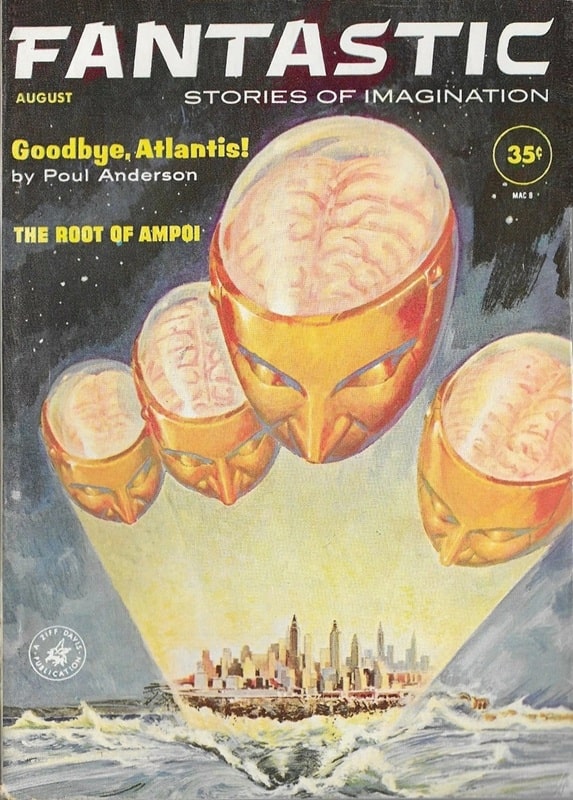
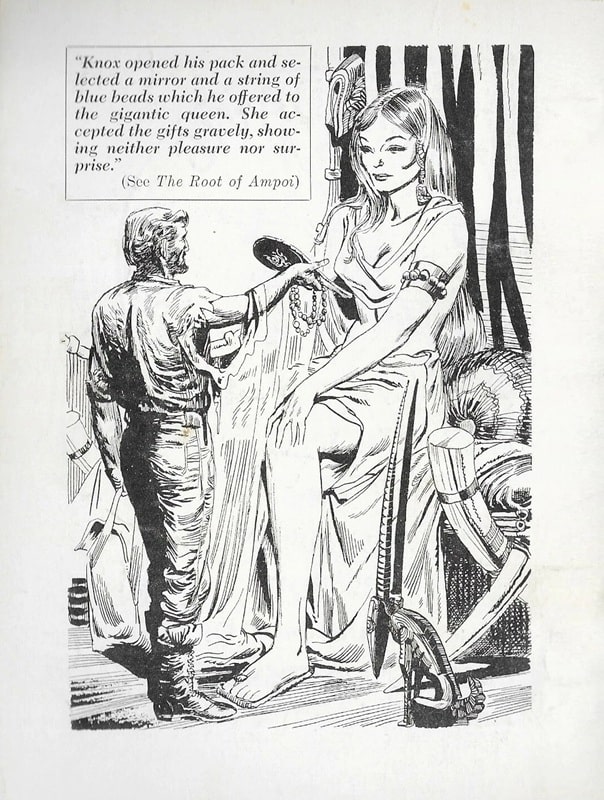
Fantastic, August 1961. Cover by Leo Summers
It’s been a long time since I did a Retro-Review from Cele Goldsmith’s time at Amazing/Fantastic. So I’m happy to be back at it! This issue is from about two years into Goldsmith’s tenure.
There are two features — Norman Lobsenz’s editorial, and the letter column, According to You. (Well, and a brief Coming Soon piece.) The editorial talks about using computers to analyze the various items certain Thais believe have magical powers, ending with a slight joke about hoping to find a love philtre “for Cele.” It introduces the concept by talking about the famous Arthur C. Clarke story in which a computer helps Tibetan monks list all the names of god — but misidentifies the story weirdly by adding another billion names: “The Ten Billion Names of God.”
[Click the images for fantastic versions.]
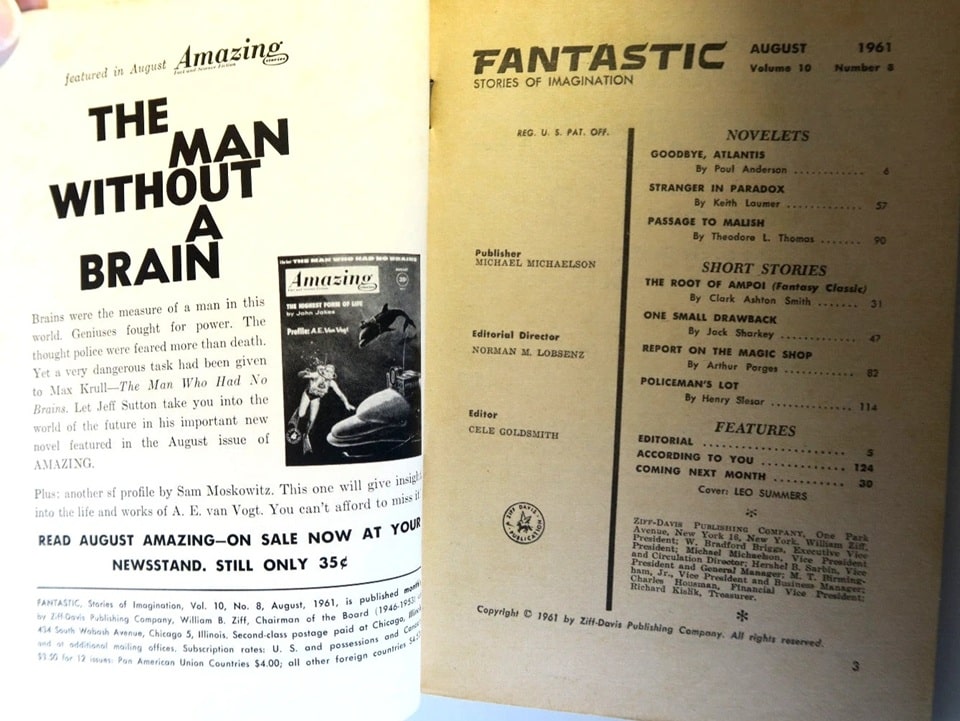 Table of Contents for Fantastic, August 1961
Table of Contents for Fantastic, August 1961
According to You has six letters. I recognized some well-known fans: Bill Bowers and Redd Boggs were both prolific fanzine editors and multiple Hugo nominees. Lawrence Crilly, John Pocsik, and David Charles Paskow are not as was well known but do get mentions in Fancyclopedia 3, and indeed the Paskow Collection at Temple University is named for David Paskow. F. C. MacKnight is the other contributor.
The letters concern mostly Fritz Leiber and the newly instituted use of one reprint per issue — both get praise. David Bunch is of course mentioned — negatively by Bowers and positively by Paskow (the latter mention getting this relieved comment from Goldsmith: “We figured that if we kept publishing [Bunch], somebody sooner or later would agree with us that he has something in his stories.”)
The cover is by Leo Summers, the interiors are by Summers, Virgil Finlay, West, Dan Adkins, and Larry Ivie, with a Summers back cover based on the Smith story, and one cartoon by Frosty.
The stories, then.
Novelets“Goodbye, Atlantis!,” by Poul Anderson (9,000 words)
“Stranger in Paradox,” by Keith Laumer (9,200 words)
“Passage to Malish,” by Theodore L. Thomas (9,000 words)
“The Root of Ampoi,” by Clark Ashton Smith (5,900 words)
“One Small Drawback,” by Jack Sharkey (3,800 words)
“Report on the Magic Shop,” by Arthur Porges (3,000 words)
“Policeman’s Lot,” by Henry Slesar (3,600 words)
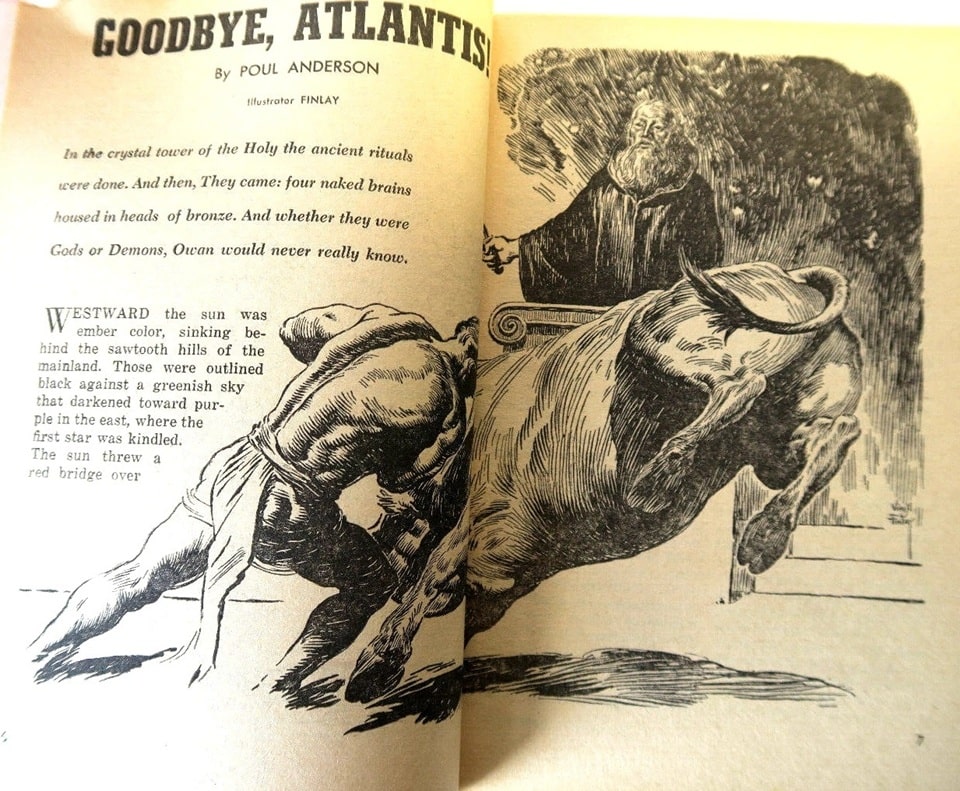 “Goodbye, Atlantis!” by Poul Anderson, illustrated by Virgil Finlay
“Goodbye, Atlantis!” by Poul Anderson, illustrated by Virgil Finlay
“Goodbye, Atlantis!” is a very obscure Anderson story — it’s only ever been reprinted once, in one of Sol Cohen’s super cheap and ugly all-reprint magazines, which mostly or entirely mined the Amazing/Fantastic backlist for material (and reprinted it (legally) without pay until SFWA objected, after which apparently Cohen made nominal payments.)
The lack of reprints is a bit odd, because “Goodbye, Atlantis!” isn’t terrible. It’s no lost classic, but it’s fine. The viewpoint character is Owan, a guard Captain in the retinue of the nobleman Donwirel and his wife Rianna, who is the niece of the former king of Atlantis, and thus cousin to the current king. Owan is in love with the beautiful Rianna, but at this time the concern is that there is a rebellion against the new king.
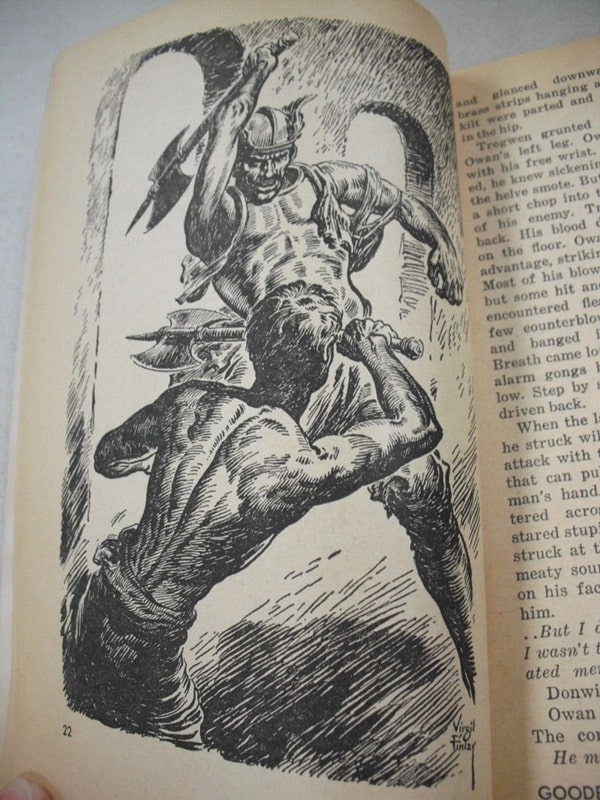 ‘Goodbye, Atlantis!” Illustration by Finlay
‘Goodbye, Atlantis!” Illustration by Finlay
The plot turns on the efforts of the Archpriest Govandon to summon the long absent gods of Atlantis to vanquish the rebels, who are clearly winning the war and have the capitol under siege. Owan has concerns — he doesn’t trust the gods, or perhaps simply doesn’t trust that Govandon’s spells will work. He goes to attend Donwirel, who is working with Govandon — and is poisoned.
It’s clear that Donwirel is a traitor, and only Rianna’s timely intervention saves Owan, after which he struggles to prevent Donwirel from stealing the spells Govandon has learned. There’s some solid action, and Owan (and Rianna) are successful — but their success proves profoundly ambiguous. (Behind it all is a sly suggestion that the rebels were right all along.)
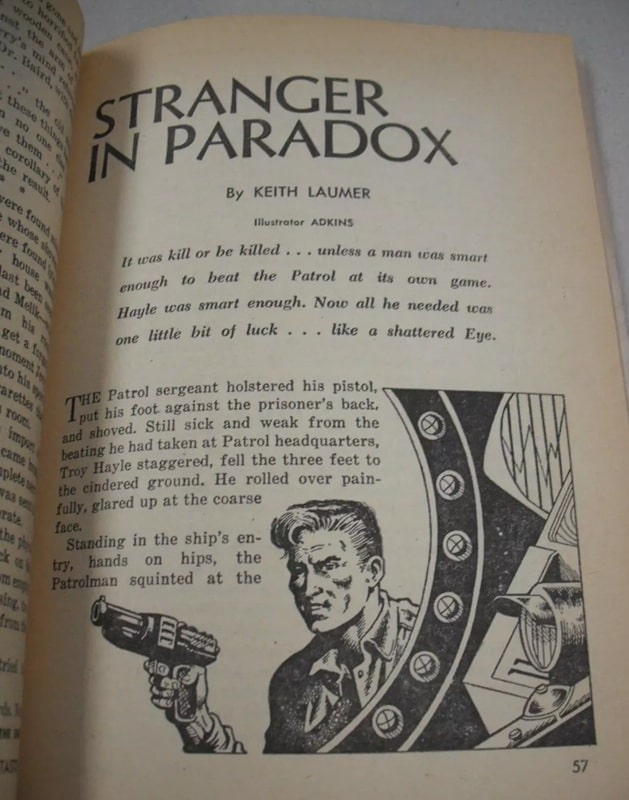 “Stranger in Paradox” by Keith Laumer. Illustrated by Dan Adkins
“Stranger in Paradox” by Keith Laumer. Illustrated by Dan Adkins
“Stranger in Paradox” was, I think, Keith Laumer’s fourth published story. The first two, “Greylorn” and “Diplomat-at-Arms” were published by Goldsmith as well — Laumer was one of her major discoveries, along with Le Guin, Disch, Zelazny and to some extent Ballard (for the American market.) The Retief stories (after “Diplomat-at-Arms”) ended up finding a home in Frederik Pohl’s If, but Goldsmith otherwise published a great deal of Laumer’s early work.
Alas, “Stranger in Paradox” is pretty awful. Hayle is dumped on the title planet by the Patrol, who seem to be the agents of the despotic rulers of this future. (Details are pretty slight.) They leave him nothing but a short sword and a reusable match. The only rule on Paradox is that prisoners cannot cooperate — they must either avoid each other or fight.
Hayle’s plan is to somehow convince a couple of other people to cooperate, and after figuring out how the Patrol keeps track of the prisoners, he manages that … and then, with a profoundly implausible plot, lots of luck, a woman prisoner falling into their laps, and utterly ridiculous concept of both how the Patrol would work and how they control civilization, they succeed. It’s just dumb dumb dumb the whole way, redeemed only slightly by the fight scenes that are, as usual, quite good — Laumer had the knack of writing fights.
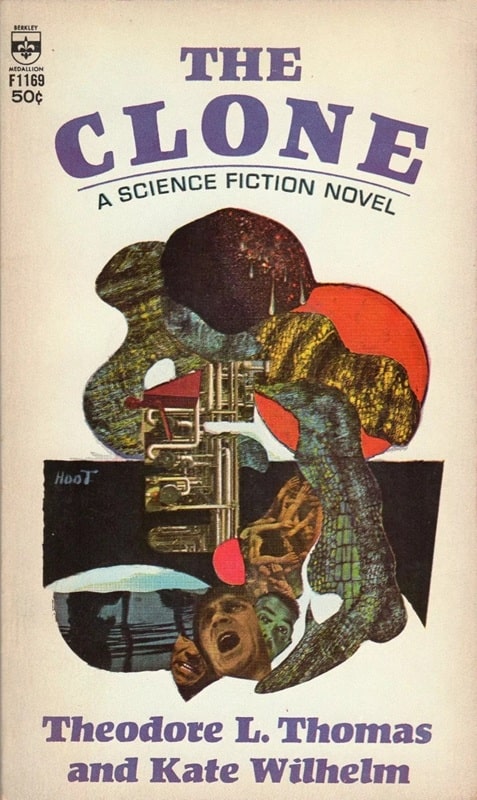
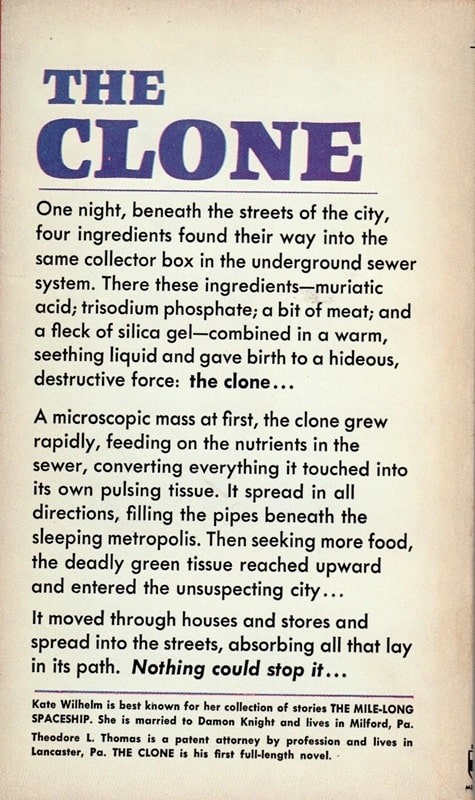
The Clone by Theodore L. Thomas and Kate Wilhelm
(Berkley Medallion, December 1965). Cover by Hoot von Zitzewitz
Theodore L. Thomas (1920-2005) was a chemical engineer and patent attorney who wrote about 50 short stories between 1952 and 1981. He wrote two novels in collaboration with Kate Wilhelm (The Clone and The Year of the Cloud.) He is probably best known still for a series of stories he wrote as “Leonard Lockhard” about science fictional complications with patents — the first two of these in collaboration with fellow patent attorney Charles Harness; and for his story “The Weather Man,” about human control of the weather.
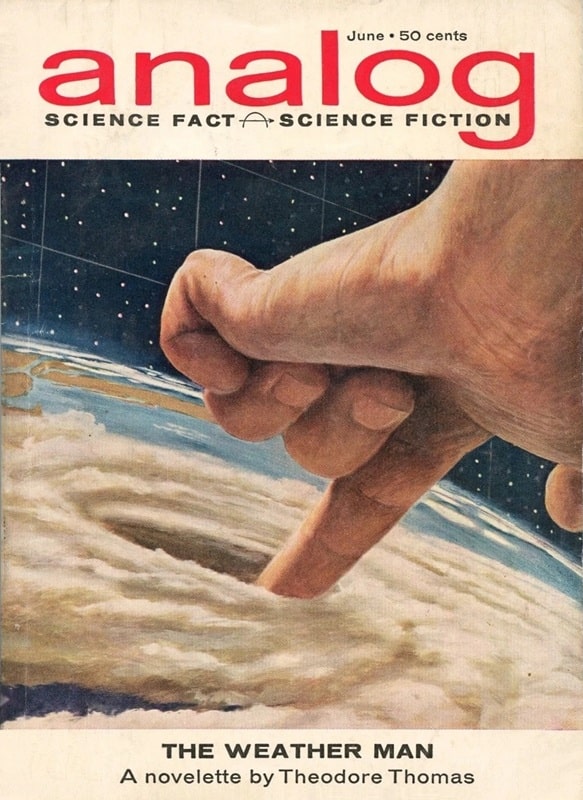 Analog Science Fact/Science Fiction June 1962, containing “The Weather Man” by Theodore L. Thomas. Cover by John Schoenherr
Analog Science Fact/Science Fiction June 1962, containing “The Weather Man” by Theodore L. Thomas. Cover by John Schoenherr
“Passage to Malish” is about a salesman who finds himself diverted from his trip to the planet Malish because it’s been determined that he’s the perfect person to confront the visiting aliens from the Large Magellanic Cloud. The solution involves turning him into a superhuman, committing genocide (or galactocide, I suppose), and then hoping he’ll consent to being turned back to a normal human before he uses his powers to subvert the Milky Way. I never believed any of this story for a second.
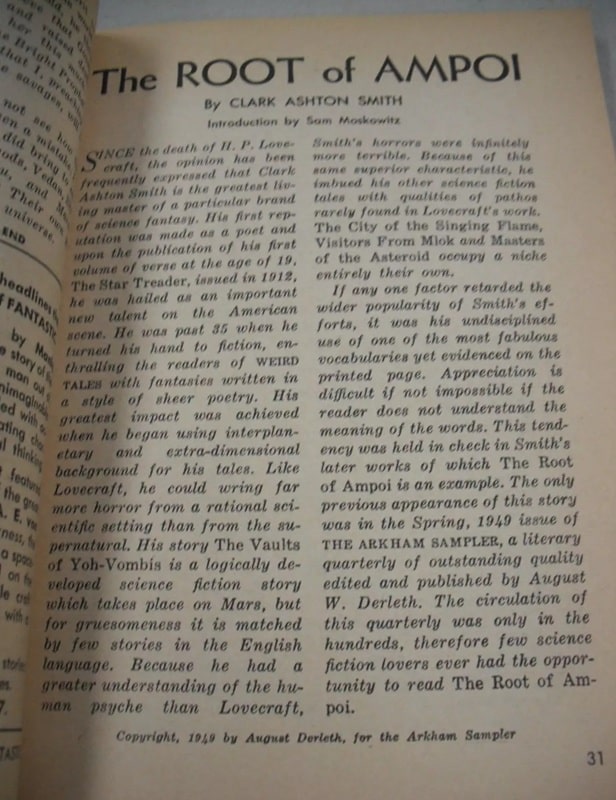
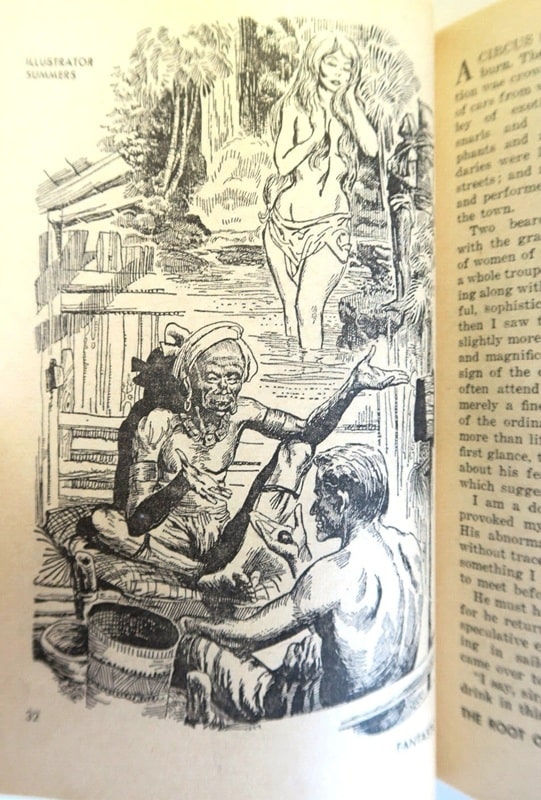
“The Root of Ampoi” by Clark Ashton Smith. Illustration by Summers
“The Root of Ampoi” is Sam Moskowitz’s choice for this month’s fantasy reprint. Clark Ashton Smith (1893-1961) was a poet and a writer of weird fiction whose reputation has gone up and down over time, and seems on the upside now. He was a regular contributor to Weird Tales, and part of Lovecraft’s circle. He was known for his ornate prose and extravagant imagination, so, Moskowitz, with his impeccable as ever taste, declaring in more or less Salieri mode that Smith used “too many words” (that’s my paraphrase of Moskowitz’ words) chose a completely uncharacteristic story to reprint. (That said, it has been reprinted fairly often, one time as “The Ampoi Giant,” so other people may disagree with me.)
“The Root of Ampoi” is a tale told by a giant working for a circus. He was a sailor, and he heard of a place on New Guinea where the men were normal sized and the women were nine feet tall. And there were rubies to be had for a song. Seeking to make his fortune, he finds this place, and learns about the secret that makes the women so tall — after the queen of those women chose him for a consort. But, unhappy with being dominated by a much larger wife, he ferrets out the secret… the punishment for which is banishment. No rubies either. But — easy to find circus work. This is really minor stuff — a competently executed tall tale, really. But it seems nothing like a real introduction to CAS.
Jack Sharkey (1931-1992) was a Cele Goldsmith regular, though to my taste he was a pretty weak writer. “One Small Drawback,” however, is not too bad at its length. Jerry, a college kid, is intrigued by his professor’s research into telekinesis, but nothing he tries has any effect. His professor is convinced that what he needs is true belief. Then something small happens that convinces Jerry he can use telekinesis… but it doesn’t work consistently. The key element he eventually discovers is pretty clever, and effectively dark.
Arthur Porges (1915-2006) wrote over 200 stories, split roughly 50/50 between mystery and SF. His stories were mostly fairly short, and were consistently clever, sometimes amusing, sometimes quite mordant. As a writer of exclusively short fiction, he’s not really widely remembered, but he was one of the most dependably enjoyable writers in the field, and his contributions appeared right up until his death, mostly in F&SF but also in Goldsmith’s magazines. “Report on the Magic Shop” is good solid fun, nothing earth-shattering, written as if the author is telling the editors about the various products sold at a magic shop he happened to stumble into.
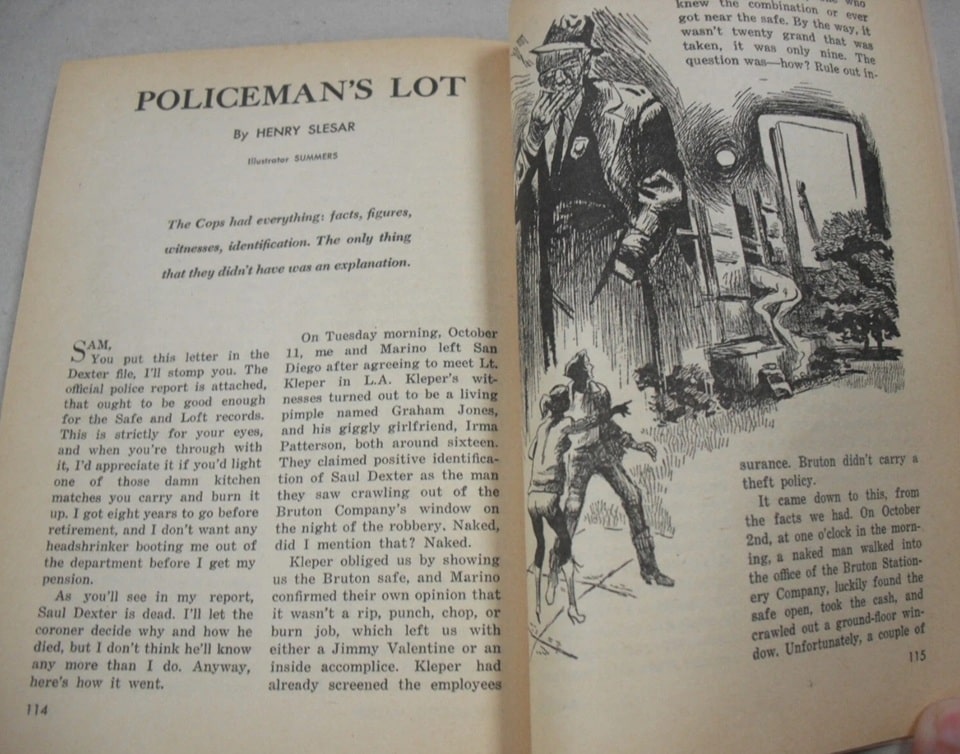 “Policeman’s Lot” by Henry Slesar. Illustration by Summers
“Policeman’s Lot” by Henry Slesar. Illustration by Summers
Henry Slesar (1927-2002) was another writer of both SF and crime fiction, with most of his SF fairly short. He was better known as a mystery writer, and so perhaps it isn’t a surprise that “Policeman’s Lot” is basically a mystery, though with a fantastical solution.
A veteran patrolman submits a report on a strange case he recently investigated, involving a couple of basically “locked room” thefts, in which in one case a man was found escaping from a window naked. Not long after, the man is found crushed to death in his house. The strange factor is that he seems to have changed height between separate arrests. The solution is kind of obvious, and acceptable except as an explanation of his death.
Rich Horton’s last article for us was We Are Missing Important Science Fiction Books. His website is Strange at Ecbatan. Rich has written over 200 articles for Black Gate, see them all here.
Women in SF&F Month: Sara Hashem
Today’s Women in SF&F Month guest is Sara Hashem! Her Egyptian-inspired epic fantasy debut novel, The Jasad Heir, was a Sunday Times bestseller and a Goodreads Choice Award nominee in the Romantasy category. Her next novel and the conclusion to her Scorched Throne duology, The Jasad Crown, will be released on July 15. I’m very excited for its release since her first novel was one of my favorite books of 2023 with its excellent banter and character dynamics, including an […]
The post Women in SF&F Month: Sara Hashem first appeared on Fantasy Cafe.Spotlight on “Measure of Devotion” by Nell Joslin
Measure of Devotion, Nell Joslin’s fantastic novel, is the sweeping grandeur of the mountains, the…
The post Spotlight on “Measure of Devotion” by Nell Joslin appeared first on LitStack.
On McPig's Wishlist - Hallowed Games
 Hallowed Gamesby C.N. Crawford
Hallowed Gamesby C.N. CrawfordIf he’s death, I crave oblivion.
I'm cursed to kill with a brush of my fingertips. My worst fear is attracting the attention of the kingdom’s magic hunters. Maelor is their mysterious, gorgeous leader--and my world falls apart when he learns my secret.
When he arrests me, my only hope is to survive a deadly competition, to win the mercy of our god. Strangely, Maelor is immune to my touch. Turns out, that’s because he’s secretly a vampire—lethally sexy, and dangerous as hell.
He's as drawn to me as I am to him. Can this beautiful monster help me survive, or will our dark attraction lead me to ruin?
A Hard Post to Write - By NotWill
2025 has been off to a rough start here at Hidden Gnome Publishing. As some of you may know from the last blog post, our cousin Ellie was diagnosed with stage four Ovarian cancer in January. She fought for four months but ultimately didn’t make it. She passed away 19 days before her 25th birthday.
Ellie was one of the cousins we grew up close to, relationally speaking. We took many cross-country RV trips as a family. I saw snow for the first time on one of those trips to Yellowstone and we brought Ellie on her first visit to Disney World. After she graduated from college, we even discussed with her the possibility of interning for Hidden Gnome to get some real world experience.
Her older brother Stuart is one of my best friends and a Cradle fan himself. I’ve spent a good chunk of the last couple months in Georgia trying to be there for him and his family. In the end, there was nothing we could do, which is probably the part that stings the most.
A little over a week ago, another member of our team, Lily, had her mom pass away unexpectedly. She and her husband Patrick, our art designer, are currently with their family trying to navigate that loss.
Life is hard and it’s difficult not to feel anger when you lose a young cousin to cancer and your mother before you’re ready to say goodbye. The only bright side is the 24 years Ellie got to impact other people’s lives and the effect a good mother can have on raising an awesome daughter.
7 of the 12 members of Hidden Gnome are grieving in different ways right now. It’s times like these where being a family company is difficult, so apologies in advance for delays in some of our deadlines we’ve communicated. We’re all trying to get back in the proverbial saddle as quickly as we can.
The great part about being a family company is that we can be there for each other. Because of this job and the fans who support Will’s career, we have the ability to take time away and support our relatives when they need it the most. Sincerely…gratitude to all of you.
Cancer sucks and I have a whole new level of empathy for anyone who has or is currently walking through this. We’re all rooting for you! And remember, “A dragon is not ashamed of tears.”
-Sam
The Struggle Is Real
Tuna and Oliver had their annual visit to the vet for vaccines and physicals. Here is Tuna being the king of everything at the vet office.



 He has no shame. Or dignity.
He has no shame. Or dignity.
Tuna, predictably, was lovely to the vet, let his blood be taken, sat like a rock for vaccines, and has normal bloodwork.
I would take a pic of Oliver for you but I have no clue where he is. He is hiding. Oliver is allergic to life. He is allergic to cedar, he is allergic to Texas, he is allergic to food additives commonly found in cat food. He has constant nasal discharge, which means he sneezes a lot, he rips his hair out, which I clean daily, and he can only eat Royal Canin Sensitive Stomach food, because everything else he throws up.
 Oliver was here at some point. This is 24 hours of me not cleaning that chair. I will get to it after that post.
Oliver was here at some point. This is 24 hours of me not cleaning that chair. I will get to it after that post.
Oliver will not eat special cat treats, tuna out of the can, or vet cat bribe treats. Only Royal Canin. That’s it. Also, he loves Meow Mix kibble, which he cannot have, because he regurgitates it right back out.
Oliver is also the reason why I have furniture covers on everything. Not only that, I have doubles, so I can swap them when company is coming. I cannot stand pet hair on furniture. It drives me up the wall so I religiously clean it with a special tool.
 In case you are wondering, this works. Skip the small one, just get the bigger one.
In case you are wondering, this works. Skip the small one, just get the bigger one.
Oliver hid in the carrier at the vet, had to be forcibly removed, and they could not draw blood even after putting him into the kitty bag. We had to leave him at the vet so they could sedate him with gabapentin. Finally, blood was drawn and the results have come back. He has IBD, Inflammatory Bowel Disorder, which we already suspected. He also has a UTI. We picked up an antibiotic for him, which we have to squirt into his mouth twice a day.
Oliver fights for his life every time we wrap him in a blanket to give him medicine. Every time that happens, he truly believes that we will murder him. Given a chance, he will claw you bloody and bite, and I just wish there was some way to make it less alarming for him, but there is not. So now, when he sees either of us, he runs and hides.
::exhales:: Oliver is a lot. He is now classified as elderly and he doesn’t react well to change. He is a sweet, clingy kitty, and I was the one who took him out of a cage in PetSmart, so he will have a home with us for the rest of his days.
Also a lizard got inside two days ago. Charlie killed it – we know this because he brought us the still twitching tail – which we confiscated. We looked for it at the time but couldn’t find it.
We found it this morning, safely tucked under a large dog pillow. It had begun to rot and it stank. I’m washing the pillow cover and contemplating if I should give up and throw the whole pillow out.
I’m supposed to be writing today, and I’m not feeling it. But I really want to get this novella done before the end of the month.
::pretends to gird loins::
Don’t write, don’t eat. Onward! To cleaning cat hair, putting pillow cover in the dryer, and then writing like the wind.
The post The Struggle Is Real first appeared on ILONA ANDREWS.
Women in SF&F Month: Karin Lowachee
Todya’s Women in SF&F Month guest is Karin Lowachee! Her short fiction includes “A Borrowing of Bones” (selected for the Locus Recommended Reading List), “Meridian” (a Sunburst Award finalist that was also selected for The Best Science Fiction of the Year, Volume 3), and “A Good Home” (selected for The Best Science Fiction of the Year, Volume 2). She is also the author the Philip K. Dick Award–nominated novel Warchild and the rest of the books in The Warchild Mosaic, […]
The post Women in SF&F Month: Karin Lowachee first appeared on Fantasy Cafe.Movie of the Week Madness: Duel
Can anyone dispute Steven Spielberg’s title as the most successful motion picture director of all time? Not if you’re talking box office, you can’t. As of June, 2024, Spielberg’s films have grossed almost eleven billion dollars, putting him two billion ahead of his nearest competitor, James Cameron, and as Randy Newman sang, it’s money that matters. In Hollywood that’s probably truer than anywhere else in the world, and the profits generated by Spielberg’s many successes have more than made up for the losses incurred by his rare failures, making the suits very, very happy.
What about recognition from colleagues and critics? He has been nominated nine times for Best Director, winning twice (for Schindler’s List and Saving Private Ryan), and he received another Oscar as the producer of Schindler’s List when that film won Best Picture. He has a star on the Hollywood Walk of Fame (you can step on him at 6801 Hollywood Boulevard), has won the Academy’s prestigious Irving Thalberg Award (are there any awards that aren’t prestigious?), and has received more honors from various cinematic guilds and organizations than can easily be counted.
This storied career had its humble beginning in television in 1969, when Spielberg directed an episode of Rod Serling’s Night Gallery, and through the early 70’s he directed episodes of various other television shows, including the very first episode of Columbo, Murder by the Book. (And yes, I know about Prescription Murder and Ransom for a Dead Man, but technically those are stand-alone TV movies, not episodes of the series.)
And speaking of TV movies, Spielberg also directed three segments of the ABC Movie of the Week, one of which still stands as arguably the best made-for-TV movie ever. I’m talking, of course, about Duel.
The ABC Movie of the Week ran for six seasons between 1969 and 1975, featuring original made-for-television fare from all genres, and the mere thought of the show can make many people of my age fall to the floor in a swoon, regaining consciousness with visions of Barbara Eden dancing in our heads and the scent of Kraft Mac and Cheese lingering in our nostrils. It’s only when we lift our faces from the carpet and see that it isn’t burnt-orange shag that we realize it’s not 1972.
Most of these “world premier” movies ranged from the merely forgettable (Gidget Gets Married) to the utterly schlocky (Satan’s School for Girls) to the absolutely godawful (The Feminist and the Fuzz). In other words, they were nothing to write home about, especially when seen from the distance of half a century (we had far fewer options in the 70’s, so when the trainer threw us a fish we clapped our flippers and snapped it up, fresh or not), but some MOWs were better than that, and at the pinnacle are a bare handful that still hold up, even when viewed with eyes unclouded by cataracts or nostalgia.
None of them stand higher than Duel, which was broadcast on Saturday, November 13, 1971. Directed by a twenty-four-year-old Steven Spielberg and scripted by the great Richard Matheson from his own short story, it’s the rare product of its era that can hit an unsuspecting viewer of today almost as hard as it did its original audience. (I’m sure it’s not a coincidence that Richard Matheson wrote two more of the best ABC MOWs, Trilogy of Terror and The Night Stalker.)
Duel begins in the most prosaic fashion imaginable, with salesman David Mann (Dennis Weaver) backing his red Plymouth Valiant out of his modest suburban garage and heading north for an important meeting with a client; almost all of the first five minutes of the film are through-the-windshield POV shots of the early stages of Mann’s journey. We see him motor up CA 5 through Los Angeles and the San Fernando Valley; eventually traffic thins out as he enters the intermediate region where upper Southern California gradually morphs into lower Central California. Soon almost all other traffic vanishes as Mann leaves the 5 and swings north-east, continuing into the Mojave Desert on smaller, two-lane highways. (Just what he could be selling to anyone in this bleak, post-apocalyptic landscape is never addressed. Geiger counters, maybe?)
It is on an empty stretch of one of these roads that the duel begins, without Mann at first even realizing it. He comes up behind a massive, dirt-encrusted, smoke-spewing tanker truck (a 1957 Peterbilt 281, chosen by Spielberg for its menacing “face”), and not wanting to be late for his meeting, Mann passes it. The truck immediately shows its displeasure by aggressively passing Mann to regain the lead, angrily blowing its horn as it goes by. Increasingly worried about falling behind schedule, Mann repasses the tanker and puts on speed in the hopes of leaving this annoyance behind.
I said the truck shows displeasure rather than the driver because all we ever see of the human operator is part of his left arm (and briefly, his cowboy boots). Nothing else is visible behind the vehicle’s filthy, sun-glared windshield, while the enormous, threatening body of the truck and its “voice” — the bellow of its horn, the roar of its engine, the threatening hiss of its hydraulics — are omnipresent. Turning the truck itself into the antagonist was a deliberate choice by Matheson and Spielberg, making Duel truly a story of Mann vs. Machine.
David soon stops at a service station to get some gas and to call his wife. While he’s still sitting in his car waiting for the attendant (remember those?), the truck pulls in beside him. For a moment, the salesman visibly shrinks back in his seat, fearing trouble, but all he ever sees of the driver, who gets out on the passenger side and stays on the far side of the truck, hidden behind the tank, are his cowboy boots. Soon the attendant shows up and checking under the hood, tells Mann he needs a radiator hose. “I’ll get it later”, David says, and when the attendant replies, “You’re the boss”, Mann mutters under his breath, “Not in my house, I’m not.” (This is what is known as a significant subtext.)
He goes inside and calls his wife, apologizing for an argument they had the night before about an incident that had happened at a party, when a friend apparently got a little too familiar with Mrs. Mann. David’s response to this was not nearly as strong as his wife wanted; the increasingly acrimonious conversation makes it clear that she thinks that her husband is not living up to his responsibility as a protector. The frustrated suburbanite doesn’t think slighting his manhood is fair — “You think I should go out and call Steve Henderson up and challenge him to a fistfight or something!” The call ends with the pair more displeased with each other than when it began.
Angry and humiliated, Mann resumes his drive, and it isn’t long before the truck reappears. The contest is just beginning.
Over the next several miles, the incidents accumulate and escalate until it begins to dawn on Mann that he has left the comfortable, predictable precincts of suburban normalcy behind and entered a raw realm where the only law is survival of the fittest, which is not a place anyone would want to bring a Plymouth Valiant. (Could any model have been more ironically named?)
After leaving the gas station, the truck quickly passes the Valiant, and then keeps the agitated Mann from passing by moving side to side to block him, until an arm extends out of the truck’s window and motions David to pass, which he does… but he has been waved into a head-on collision with an oncoming pickup truck, which he is barely able to avoid. It could not have been an accident. The truck has deliberately tried to kill him.
Soon the tanker is dangerously crowding David, coming up fast from behind, forcing him to increase his speed, until he finally loses control of the car and veers off the highway, coming to a stop after crashing through a wooden fence as the truck roars past. Staggering into a nearby roadside diner, the shaken salesman makes his way into the bathroom, where he slumps over the sink and attempts to recover his composure. In a voice-over, we are privy to Mann’s thoughts, which distill the whole movie into a few lines (Weaver has almost all of Duel’s dialogue, in voice-over or spoken aloud to himself in the car):
Well, you never know. You just never know. You just go along figuring some things don’t change, ever. Like being able to drive on a public highway without somebody trying to murder you… and then one stupid thing happens. Twenty, twenty-five minutes out of your whole life, and all the ropes that kept you hangin’ in there get cut loose. And it’s like, there you are, right back in the jungle again. All right boy, it was a nightmare, but it’s over now. It’s all over.
Walking out of the restroom, Mann looks out of the diner’s wide front window and sees the truck, parked right outside, implacably waiting for him. He’s still in the jungle, and his nightmare is far from over.
Sitting around the room are a half dozen beefy trucker types, and every damn one of them is wearing cowboy boots. Deciding that one heavy-looking fellow sitting in a booth nursing a beer is his tormentor, David walks up and starts remonstrating with the trucker, telling him to stop the harassment and threatening to call the police if he doesn’t.
The Opponents
When the baffled trucker says he has no idea what Mann is talking about, David, who is visibly shaking with tension and anxiety, flares into a rage and slaps the beer out of the man’s hand, provoking the guy to jump out of the booth and beat the crap out of him. When the dazed Mann looks up from the floor, he sees the burly teamster storm out of the diner and climb into… a different truck. A moment later, the tanker pulls out and heads up the road; the driver was never in the diner at all. After a few minutes, Mann leaves the building and follows hopelessly.
The contest continues, as a desperate Mann tries every way he can to bring it to an end.
Trying to speed ahead of the truck in the hopes of getting away doesn’t work — in fact it almost proves fatal when Mann has to stop for a train at a railroad crossing and the truck comes up from behind and tries to push the Valiant into the path of the speeding locomotive. Terrain briefly seems to come to Mann’s rescue when he gets to an uphill grade; seeing his opportunity, David puts on all the speed he can, sending his much lighter vehicle flying up the hill, while maniacally chanting, “You can’t beat me on the grade! You can’t beat me on the grade!!” The grade runs out quickly, however, and Mann is right back where he started.
Calling the police doesn’t work — Mann pulls off at one of those ubiquitous (or they used to be, anyway) desert roadside attractions (visit the Snakearama!) and gets in a phone booth, but before the operator can connect him with the authorities, the truck barrels into the booth and demolishes it, with Mann barely escaping in time. (We see the truck coming; Mann, intent on his call, doesn’t. The timing couldn’t be any narrower, and for a hair-raising instant, we think, “My God, Dennis Weaver is going to get killed making a freakin’ ABC Movie of the Week!!”) The truck then pursues him around the Snakearama lot, casually destroying displays holding snakes and spiders and other nasty Southwest critters. (At one point, David barely avoids being bitten by a rattler and has to knock a tarantula off his leg before scrambling back into his car and fleeing. The once thoroughly-domesticated salesman is truly back in a world red with tooth and claw.)
Parking for an hour and waiting for the truck to leave him behind doesn’t work; his antagonist is waiting for him when he resumes his journey. (Oddly, Mann never considers just turning around and going home. This client he’s going to meet must have a hell of an account. Or maybe he’d just rather face the truck than his wife.)
Flagging down a passing car and asking for help doesn’t work; the nervous, elderly couple that David manages to stop are quickly run off by the truck. (The wife was against getting involved anyway.)
Finally, as the Valiant and the truck are racing down a series of twisty side roads, the inevitable happens — the radiator hose that Mann was warned about blows. The car begins to overheat and the engine starts to thump and shudder, and through blood-smeared lips and teeth (during all the jolting and jouncing he has badly bitten his lip) David Mann ignores the Deity that he likely gave little thought to anyway, back when the biggest trial he faced was mowing the lawn or making a sales pitch. Instead, in the last extremity, he frantically talks to the car itself, pleading, screaming, weeping, begging it for just a little more speed.
Mann gains a little distance when he comes to a place where he is able to coast down one side of a hill while the truck is still climbing the other side, and it is here that the Valiant rolls into a dead end, with the road that the truck will momentarily appear on behind David and a cliff in front of him. This is the end of the line; unless he can think of something, David Mann will be dead in a few minutes. The businessman has been defeated at every point… but in the jungle, the savage knows what to do.
Mann turns the Valiant so that it will be facing the truck when it arrives, and when it does, he finally takes the offensive and drives at the killer head-on. (The way Spielberg shoots the scene makes you think of two jousting knights charging at each other in a tourney.) Jamming the accelerator to the floor with his briefcase, Mann jumps out just before the vehicles collide. The Valiant jams up underneath the front of the truck and explodes; blinded by smoke and flame, the still-faceless driver is unable to brake or downshift rapidly enough to keep the truck from going over the cliff, which it does in slow-motion, with deafening, almost dinosaur-like shrieks and bellows and groans coming from its tortured metal body.
Mann rushes up to the brink, looking down at the wreckage below. He watches as one of the truck’s huge wheels turns slower… and slower… and finally stops. There is no more movement, no more sound. The Monster is dead.
The last paragraph of Richard Matheson’s story describes what happens next:
Then, unexpectedly, emotion came. Not dread, at first, and not regret; not the nausea that followed soon. It was a primeval tumult in the mind: the cry of some ancestral beast above the body of its vanquished foe.
David Mann, civilized, suburban husband and father, the proud possessor of a good job and a nice house and (when the day began) a shiny mid-size American car, shrieks and capers along the edge of a cliff, dancing a frenzied dance of victory, singing a wordless song over the shattered corpse of his adversary.
The last shot of Duel shows Mann sitting on the brink of the chasm, utterly drained, silently tossing pebbles into the abyss as the sun goes down behind him. He will likely sit there all night. What will he do when the sun comes up in the morning? Will he just get up and walk away? Is there anything to go back to?
Certainly, the rising sun will light a different world than it did the morning before, when Mann left his sleeping wife and backed out of his garage, and if he does go back home, I suspect that handsy Steve Henderson had better watch out…
Duel is (forgive me) a smashing piece of work, and after fifty years of achievement at the highest level, it’s still one of the best things that Steven Spielberg has ever done. (Apparently he agrees — he has said that he watches it a couple of times a year.)
First praise goes to Richard Matheson for laying such a solid foundation. His script is all essentials; pared to the bone, it really moves, especially in Duel’s original broadcast version, which ran only seventy-four minutes. (The movie was so successful with the audience and critics that the studio quickly had Matheson write some additional scenes, and Spielberg shot another fifteen minutes so that Duel could get a limited theatrical release.)
The terror springs from the believability of the situation, from its very ordinariness, which was always Matheson’s trademark. (He based Duel on an encounter he actually had with a truck on a California highway on November 22, 1963, the day President Kennedy was shot.) Who hasn’t thought about how isolated and vulnerable we are in our little metal boxes when we’re out in the middle of nowhere? There are times when if civilization is no more than a half-hour away, it might as well be on the far side of the moon, and if we were called on to be our own last resource in a life-or-death situation, how many of us would be up to it?
Then, Steven Spielberg’s direction does full justice to the possibilities in this rich scenario. At twenty-four years old, he already seems a master; there is nothing slack, uncertain, or clumsy, only relentless, constantly escalating tension that’s so perfectly, mercilessly staged that when this harrowing movie is over, you’ll have to take a valium and lie down after wringing out your sweat-soaked clothes.
Because we’re with the story’s protagonist every minute, an extra-large burden is placed on Duel’s leading man, and Dennis Weaver carries that load with ease. He is completely believable in every moment of confusion, frustration, fear, panic, hope, despair and exultation. One false note could have destroyed the whole character, but there are no false notes, and when it’s time to go over the top, Weaver effortlessly carries us over the top with him. It’s a great performance.
Duel has one last excellence that I can’t fail to mention — the stunt driving. The delight of watching a pre-CGI action film with nothing but practical effects is hard to overstate. What with Bullitt, The French Connection, The Rockford Files, Mannix and the countless other police and detective yarns that dominated television and movies in that era, the 60’s and 70’s were the glory years of car chases and car crashes.
Duel is practically an encyclopedia of car stunts (Weaver’s driving double was the great Dale Van Sickel), and the high-speed swerves, skids, fishtails, scrapes and hairbreadth near-misses will have you ducking, flinching, and yelping in a way that the whole Fast and Furious franchise couldn’t manage over the course of ten entire (and entirely silly) movies.
So do yourself a favor — install seat belts on your couch and watch Duel. You’ll experience the pulse-pounding pleasures of terror and savagery and triumph right in the comfort of your own safe and civilized living room, and when it’s over, you’ll thank Richard Matheson, Steven Spielberg, Dennis Weaver, the ABC Movie of the Week and me.
And one more thing — if you plan on ever leaving that living room to venture into the unpredictable world outside, take the advice of someone who once worked in auto service: stop fooling around and get your belts and hoses replaced. Your life may very well depend on it.
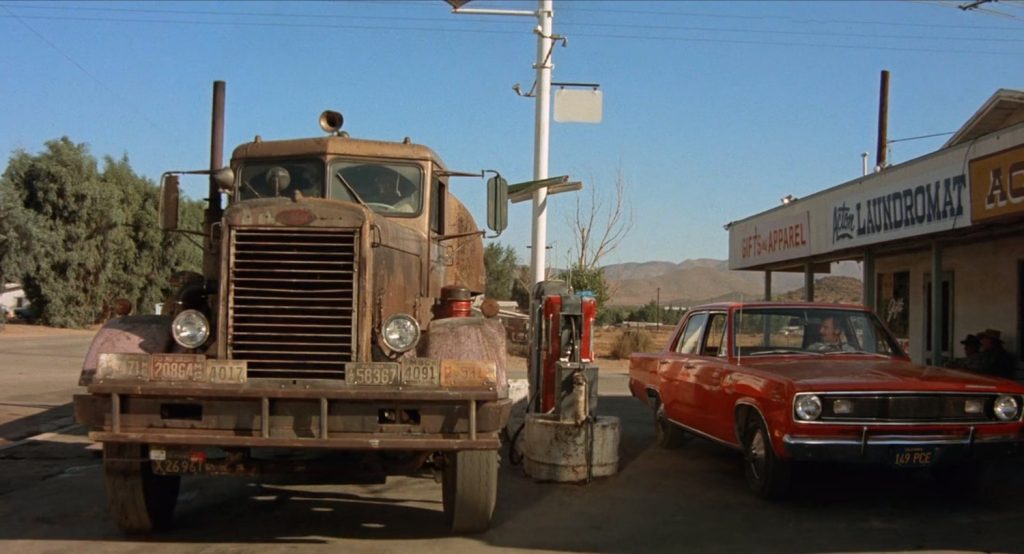 Always Trust Your Gas Station Attendant
Always Trust Your Gas Station Attendant
Thomas Parker is a native Southern Californian and a lifelong science fiction, fantasy, and mystery fan. When not corrupting the next generation as a fourth grade teacher, he collects Roger Corman movies, Silver Age comic books, Ace doubles, and despairing looks from his wife. His last article for us was A Metaphysical Nightmare: Brian Moore’s Cold Heaven
7 Author Shoutouts | Authors We Love To Recommend
Here are seven Author Shoutouts for this week. Fine one of your favorite authors or…
The post 7 Author Shoutouts | Authors We Love To Recommend appeared first on LitStack.
Vexing the Grumpy Orc - Book Review by Voodoo Bride
 Vexing the Grumpy Orc (Silvermist Mates #3)by Chloe Graves
Vexing the Grumpy Orc (Silvermist Mates #3)by Chloe GravesWhat is it about:Territory lines weren't made to keep out fate.
HannahSaving my petrified familiar requires rare mountain mushrooms and sacred ritual grounds. Unfortunately, both sit squarely in one extremely hot and incredibly grumpy orc's territory. One defiant step across my ritual circle unleashes magic far more dangerous than any gorgon's curse—the kind that burns between bodies instead of bones.
But with Digby's stone form growing colder by the day, failure isn't an option—even if success means trusting the orc who ruins my spells with a single touch.
GalanWitches destroy everything they touch. My father's exile taught me that lesson well.
But this witch stalks my woods with a sharp tongue and even sharper magic. Her fierce loyalty and forbidden rituals set my blood burning and instincts snarling for more.
My chief shatters my solitude and commands me to keep her safe while my father orders me to march her off a cliff. Blood should win over heart, but she makes me question every truth I thought I knew.
Fate branded Hannah into my soul, and I won't rest until I claim her as mine.
What did Voodoo Bride think of it:I have a soft spot for grumpy men (well, others think they're grumpy, but they're not grumpy to me) so I decided to give this book a try.
Maybe I should have started with the first book, where this world gets set up. Because I was convinced this was Other World Fantasy Romance. It even read that way at first. Then suddenly there was a mention of American states, and then jeans, and other modern stuff.
Turns out this is what I would call an Urban Fantasy Romance.
That really threw me. I mean: Orcs in Fantasy or SciFi/Cyberpunk settings are one thing, but it seems I never thought of Orcs belonging in Urban Fantasy. The Orc village feeling very Other World Fantasy didn't help in getting used to the otherwise modern setting.
But that weird disconnect aside:I really enjoyed the romance.
I didn't like Hannah at first. She really is annoying and a total jerk for someone caught trespassing, and I was just as grumpy about her as Galan (who I did like right away).But things get hot and steamy fast between them, and she does get less annoying luckily enough. From then on I was totally invested in the two of them figuring things out and getting in some more loving.
All in all a very enjoyable Romance and I might try other books in this series.
Why should you read it:Hot Grumpy Orc!
A Sword & Sorcery Series I Really Love: Flashing Swords!, edited by Lin Carter
Flashing Swords! #2, 4, & 5 (Science Fiction Book Club, September 1973, May 1977,
and December 1981). Covers by Frank Frazetta, Gary Viskupic, and Ron Miller
It’s time to take a look at another Sword & Sorcery anthology series I really love: Flashing Swords, edited by Lin Carter. It is second in my affections only to the Swords Against Darkness 5-book series edited by Andy Offutt that I wrote about here last year.
Flashing Swords! came out of the group known as SAGA, which stood for the Swordsmen and Sorcerers Guild of America, a group in the 1970s and 80s that included almost all the elite S&S writers of the age.
They were an informal group but Lin Carter was the closest thing they had to a leader. Under his editorship, five outstanding anthologies of works from their members appeared, all new stories, not reprints. As shown in the pictures below, I have the volumes from Dell paperbacks, as they were originally released, and three from Nelson Doubleday in hardback (above), as they were offered by the Science Fiction Book Club.
[Click the images for flash versions.]
Flashing Swords #1 (Dell, July 1973). Cover by Frank Frazetta
Flashing Swords #1 (1973) has 4 longish stories by Leiber, Vance, Anderson and Carter. All were strong and this is probably the strongest of all the volumes. Anderson’s story, “The Merman’s Children,” is the best, and Carter’s story, “The Higher Heresies of Oolimar,” is one of his strongest ever.
The cover was an awesome Frazetta, one of my favorites of his paintings behind his Kane and Death Dealer art. The volume was dedicated appropriately to Robert E. Howard.
Flashing Swords! #2 (Dell, April 1974). Cover by Frank Frazetta
Flashing Swords #2 (1973) is dedicated to Henry Kuttner. It had four more long stories, by L. Sprague de Camp (with whom Carter had a long history), Michael Moorcock, Andre Norton, and John Jakes.
Moorcock’s story, “The Jade Man’s Eyes,” was of Elric, and Jakes’ story, “Ghouls Garden,” was about his character Brak. I’ll talk more about both authors eventually here but both these tales were very good and I particularly loved the Brak story, which made me seek out more of the tales.
Flashing Swords #1 & 2, UK editions (Mayflower, 1974 and February 1975). Covers by Bruce Pennington
The hardback has a great Frazetta cover, but have a look, too, at the paperback cover from Mayflower books (above), which I found online. I like that one even better than the Frazetta I think, although that sounds almost blasphemous.
Bruce Pennington did it and I wish I had that edition.
Flashing Swords! #3: Wizards and Warriors (Dell, August 1976). Cover by Don Maitz
Flashing Swords #3 (1976) bore a subtitle, Warriors and Wizards. It was dedicated to Clifford Ball. This was the weakest of the five volumes, although still good. It had stories by de Camp, Fritz Leiber, Andre Norton, Carter, and Avram Davidson.
The Leiber story, “The Frost Montreme” — Fafhrd and the Gray Mouser — was the strongest. Don Maitz is the cover artist. It’s good, but a bit less barbaric than I like. Very Renaissance looking.
Flashing Swords! #4: Barbarians and Black Magicians (Dell, November 1977). Cover by Don Maitz
Flashing Swords #4 (1977) is subtitled Barbarians and Black Magicians. This one is dedicated to Norvell Page, who I’ll be covering here. Stories by Vance, Anderson, Jakes (Brak; Storm in a Bottle), Katherine Kurtz, and Moorcock (Elric; “the Lands Beyond the World”).
This one is as strong as the original volume, and I like the hardback cover by Gary Viskupik. It also has some cool interior illos by Rick Bryant. The paperback cover, which I found online, is by Don Maitz again and looks like an Elric representation.
Flashing Swords! #5: Demons and Daggers (Dell, December 1981). Cover by Rich Corben
Flashing Swords #5 (1981) is subtitled Demons and Daggers. No dedication. It has a cool wraparound cover by Ron Miller, although it’s my least favorite of the series. The Dell paperback has a cover by Richard Corben.
Includes stories by Roger Zelazny (a Dilvish tale), C. J. Cherryh, Diane Duane, Tanith Lee, and the first humorous story in the series by Craig Shaw Gardner. I didn’t think it was as strong as #1, #2, or #4, but somewhat better than #3.
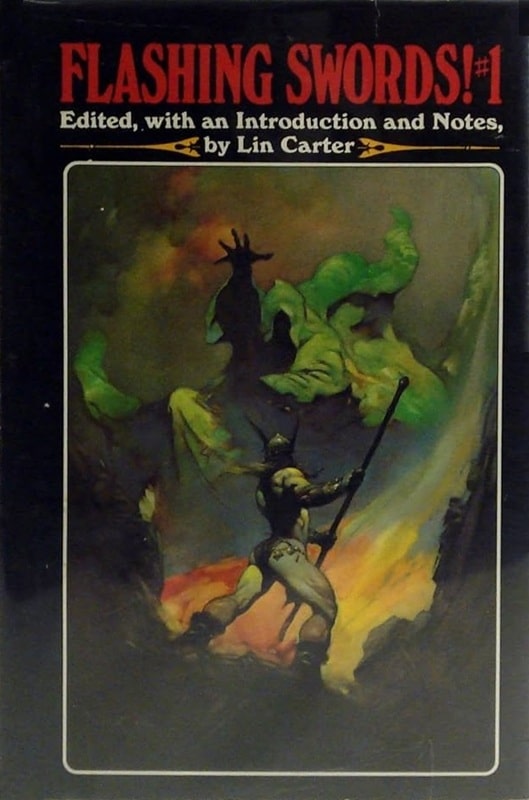
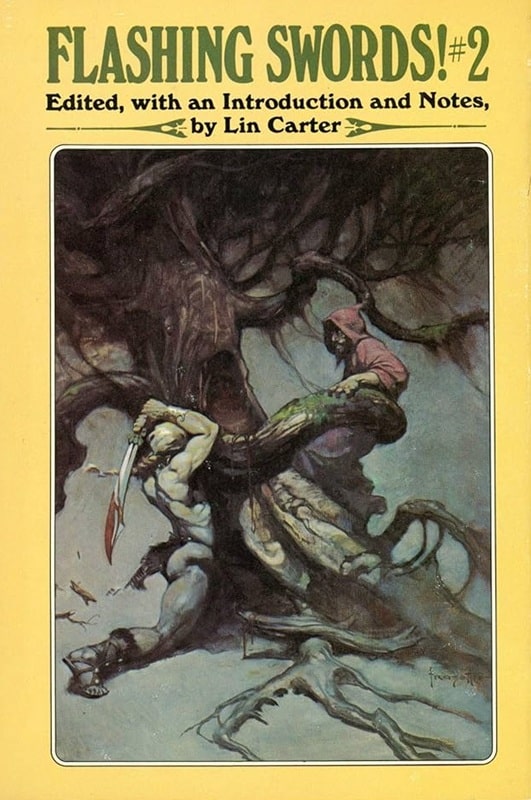
Flashing Swords! #1 & 2 (Science Fiction Book Club, April and September 1973). Covers by Frank Frazetta
In 2020, Robert Price, Lin Carter’s literary executor, revived the series as Lin Carter’s Flashing Swords. There have been two volumes published, although the first one created a minor storm of controversy over the introduction by Price. I have not yet bought or read these two volumes.
I’ve also included above the hardcover covers for volumes 1 and 2 (above), both by Frazetta.
Charles Gramlich administers The Swords & Planet League group on Facebook, where this post first appeared. His last article for Black Gate was Sword & Sorcery on a Post-Apocalyptic Earth: Blackmark by Gil Kane.
Women in SF&F Month: J. D. Evans
Today’s Women in SF&F Month guest is J. D. Evans! She is the author of the epic fantasy romance series Mages of the Wheel, which currently contains five novels. Reign & Ruin, her debut novel and the Self-Published Fantasy Blog-Off Award–winning first book in her series, features a Sultana and prince who “must find a way to save their people from annihilation and balance the sacred Wheel.” I’m thrilled she’s here today with her essay “In Defense of the Kind […]
The post Women in SF&F Month: J. D. Evans first appeared on Fantasy Cafe.





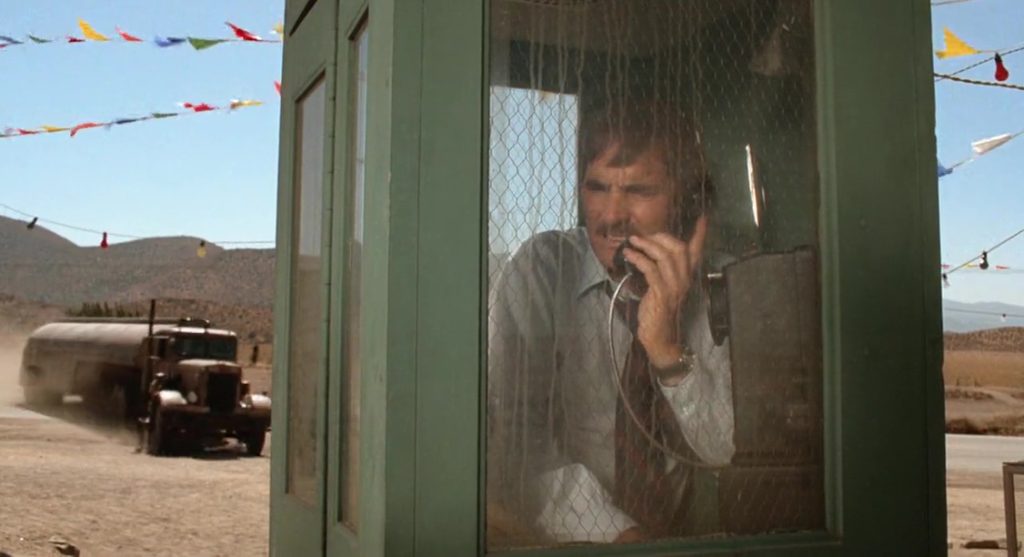


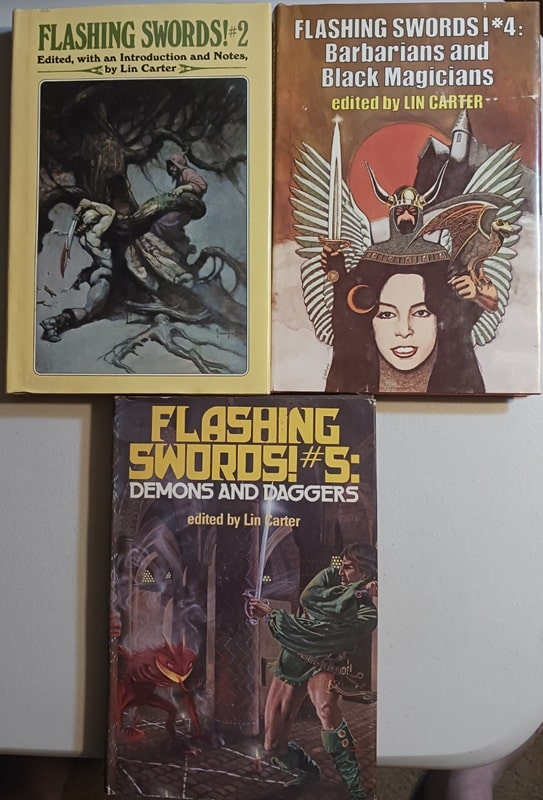
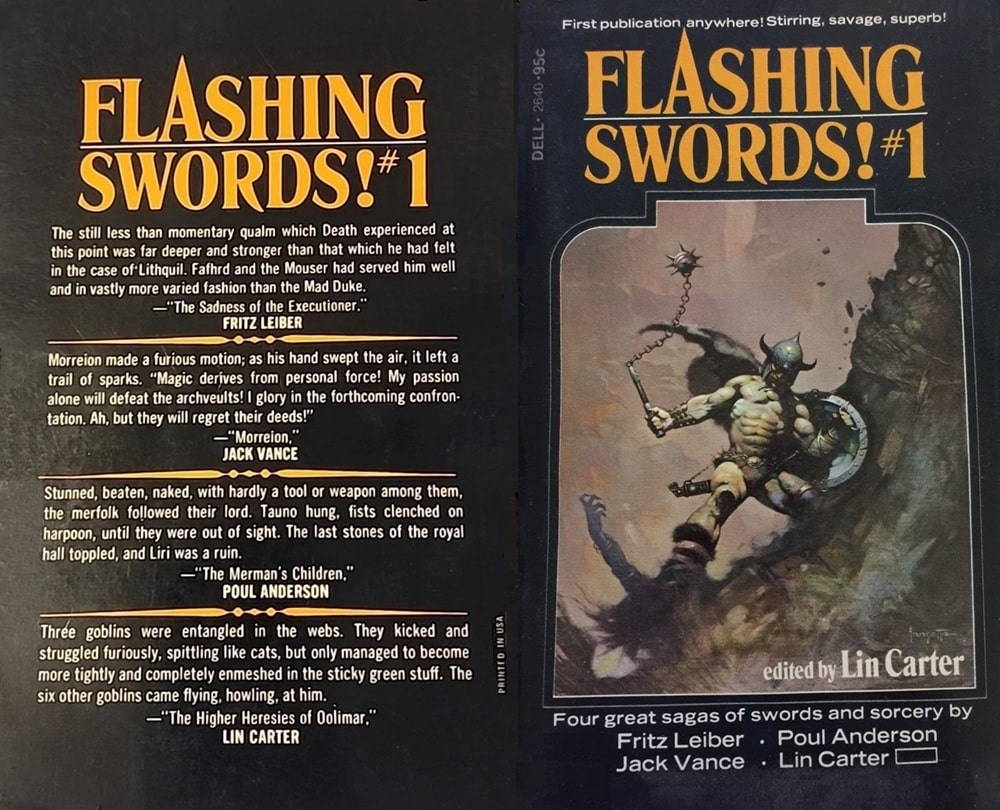
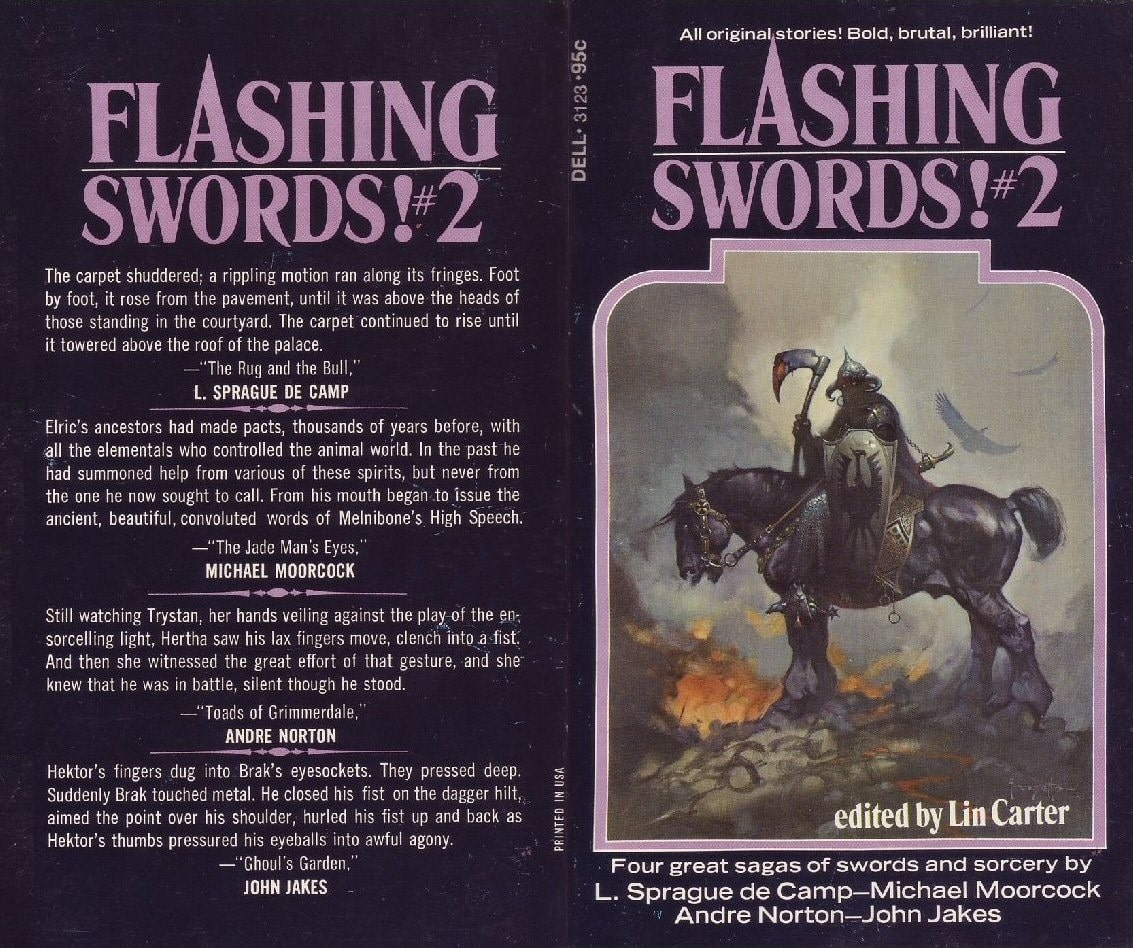
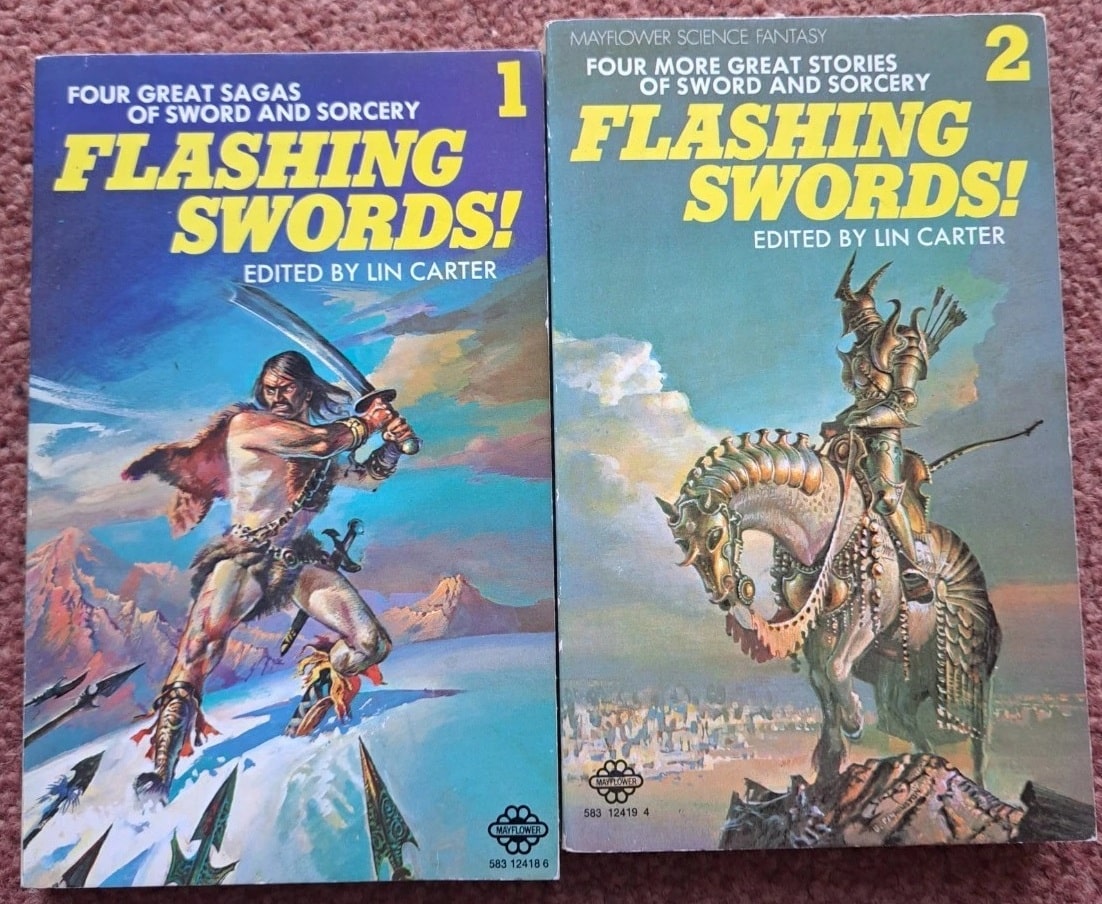
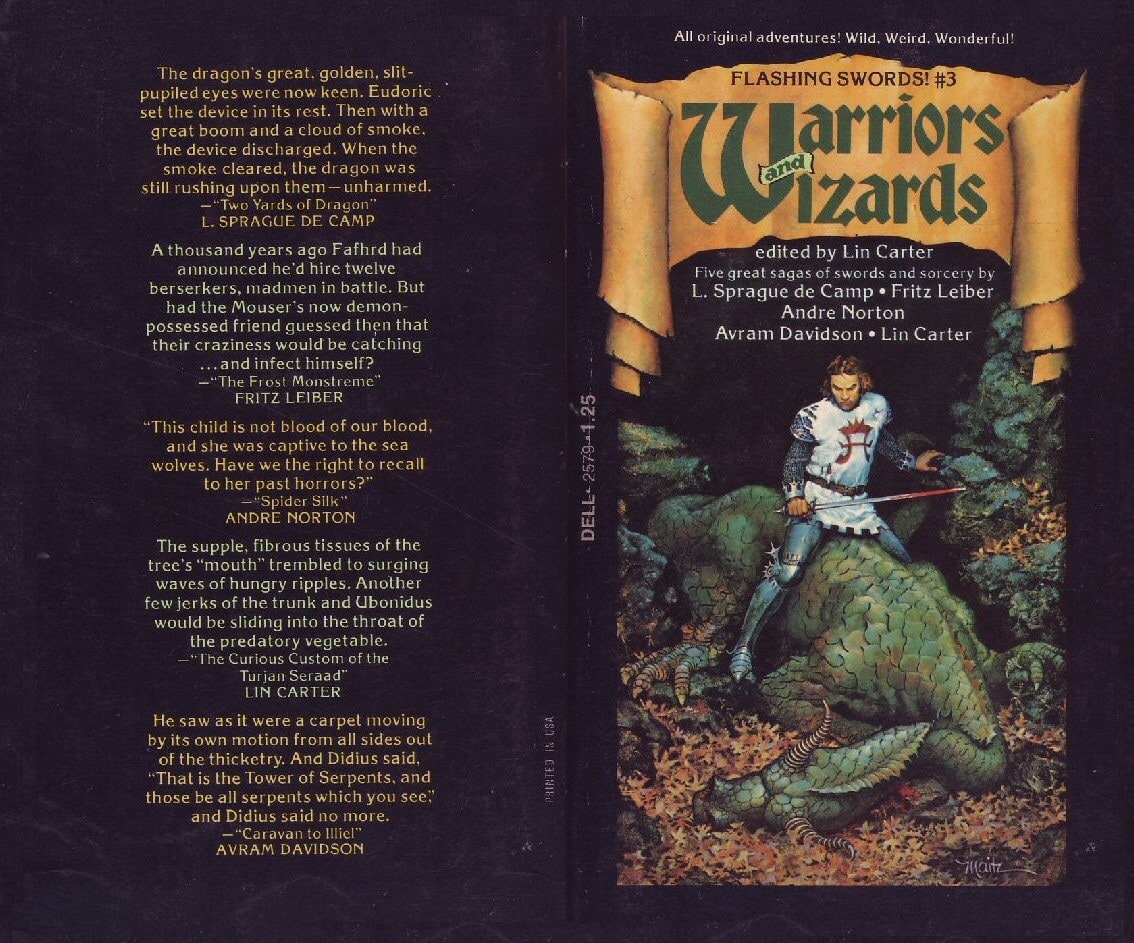
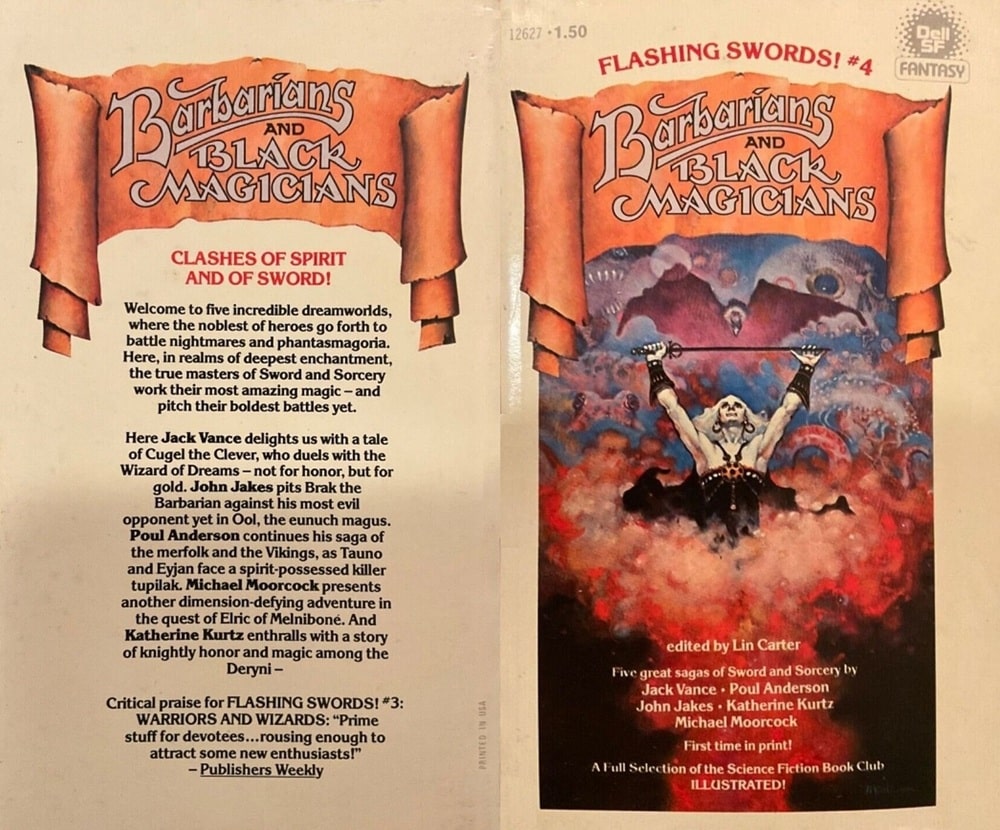
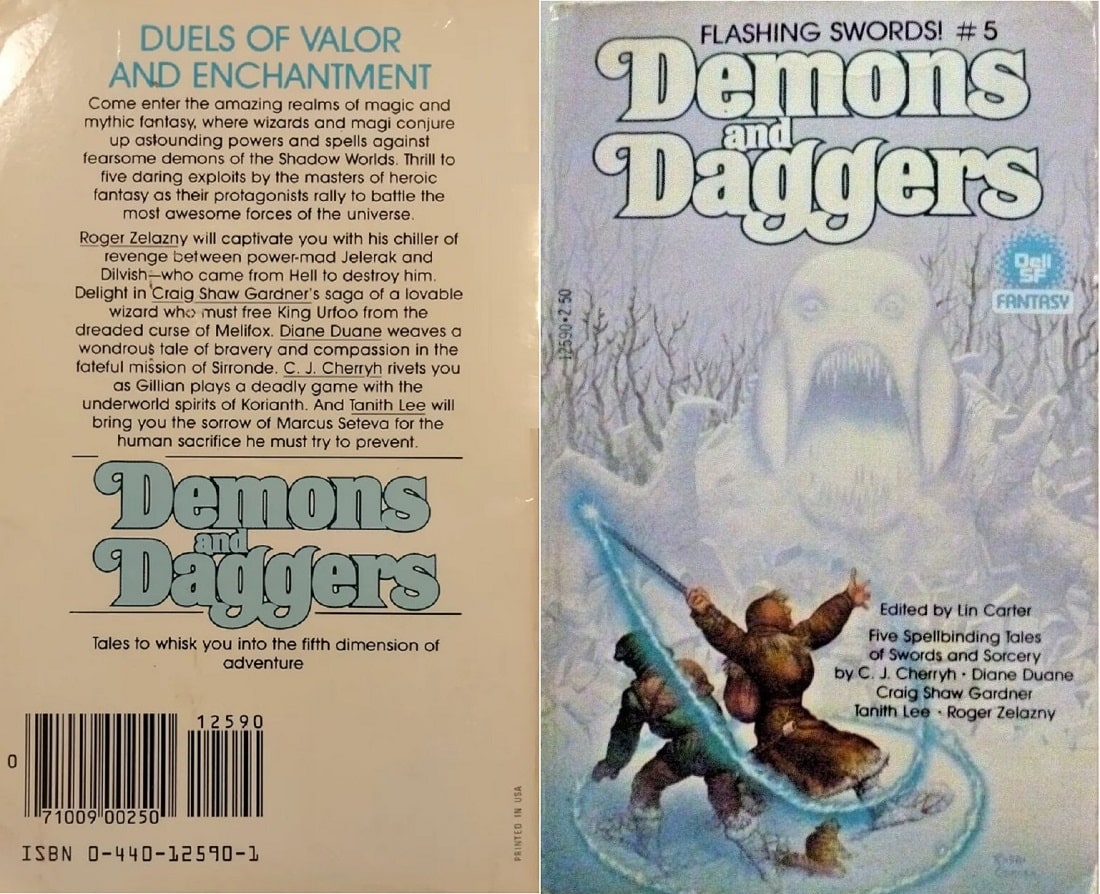
Recent comments